







































By JAMES GORDON Managing Editor
By NELLY HERNANDEZ TEJADA Editor-in-Chief
By BRYCE ODENTHAL Collaboration Editor
To our readers,
Every week, we have the privilege of reflecting the triumphs and challenges of members in our community. This week, we spotlight the Latino and Spanish-speaking audience through our Hispanic and Latino Heritage Month edition.
From Sept. 15 to Oct. 15 each year, we are given an opportunity to honor the lasting impact Latinos and Spanish-speaking figures have continually worked to move this country forward. Across generations, they have contributed to every chapter of our shared history — in classrooms, on stages, in neighborhoods, in government halls and so much more.
Every day, without fail, this community shows the strength of its voice. It shines through our businesses, art, cuisine and public service. Their contributions are not only a reflection of who they are, but also a reminder of what it takes to shape the future.
This year’s Hispanic and Latino Heritage Month edition holds special meaning for us,
as it is the first time in The Signpost’s history that every member of our top editorial leadership is Latino, a milestone that reminds us why representation matters, both in our newsroom and in the stories we tell.
However, not everyone shares these same feelings. In our time at The Signpost we have experienced pushback. Not everyone embraces initiatives like our Translation Desk, special editions and diverse culture — a fundamental part of our newsroom. During a time of political unrest, representation of different cultures have been challenging, especially due to recent legislative decisions.
Laws like HB 261, which limits discussions of race and identity in government and educational settings, risk silencing important

conversations. Hispanic and Latin-American communities, in particular, feel the weight of these restrictions, forcing many to navigate around complex and deeply personal topics.
We recognize these barriers rooted in misunderstanding still exist, which is why representing Latino voices matters now more than ever.
This representation matters especially as The Signpost not only serves Weber State University, but the community of Ogden. With its large Hispanic population, having a sense of cultural awareness within our team helps us to better serve our community in the ways that matter.
Being part of a group filled with so many backgrounds, and stories to tell, has emphasized the importance of understanding. Although not all of our staff share Latin or Hispanic roots, many of us come from underrepresented communities, especially within the state of Utah.
While there are good and difficult parts of being Hispanic and/or Latino, we still celebrate each other, our culture, our upbringings, our traditions, our values, our differences and our way of life. Not all of us speak Spanish or have the most traditional Latin American roots but we are still a community. In our newsroom, we recognize our diversity strengthens not only Latinos on our staff, but everyone’s skills as journalists.
This edition at The Signpost is much more than Hispanic and Latino Heritage Month: it’s a celebration of who we are and what we represent.
With Pride, Top Leadership, The Signpost
Weber State University Collaboration Editor Bryce Odenthall holds up a Dominican Republican flag, Editor-in-Chief Nelly Hernandez holds up a Peruvian flag and Managing Editor James Gordon holds up a Mexican
Traducido Por
NELLY HERNANDEZ TEJADA
Jefa Editora
Traducido Por
VICTORIA HERNANDEZ
Co-Editora de Tradución
A nuestros lectores,
Cada semana tenemos el privilegio de reflejar los triunfos y dificultades de los miembros de nuestra comunidad. Esta semana, enfocamos nuestra atención a la audiencia Latino y hispanohablante con nuestra Edición del Mes de Herencia Hispano y Latino.
Cada año desde el 15 de septiembre hasta el 15 de octubre, honramos el impacto continuado de las figuras Latinos y Hispanos que han trabajado para desarrollar este país. Sobre generaciones, han contribuido a cada etapa de nuestra historia compartida — en clases, en escenarios, en vecindades, en el gobierno y muchos más.
Sin fallar, cada día esta comunidad demuestra su fuerza de su voz. Brilla en sus negocios, arte, cocina y servicio público. Sus contribuciones no solamente reflejan de quienes son, pero es un recuerdo de lo que se necesita para dar forma al futuro.
Esta Edición del Mes de Herencia Hispano y Latino tiene significado especial para nosotros, porque es la primera vez en la historia de The Signpost que cada miembro de nuestro liderazgo editorial principal son Latinos, un hito que demuestra porque la representación es significante, tanto en nuestra sala de prensa y en las historias que contamos. Sin embargo, no todos están de acuerdo con esto. En nuestro tiempo en The Signpost hemos experimentado retroceso. A todos no aceptan algunas de nuestras iniciativas como nuestro Escritorio de Traducción, ediciones
especiales y cultura diversa — una parte fundamental de nuestra sala de prensa. Durante un tiempo de inestabilidad política, la representación de diferentes culturas ha sido difícil, especialmente debido a decisiones legislativas.
Leyes como HB 261, que limita las discusiones de raza e identidad en lugares gubernamentales y educativas, arriesga conversaciones importantes. Las comunidades Hispanos y Latinoamericanos particularmente, sienten el peso de estas restricciones, obligando a muchos a navegar por temas complejos y profundamente personales.
Reconocemos que estos obstáculos son enraizados en malentendidos, esta es la razón porque representar las voces Latinas importa ahora más que nunca.
Esta representación importa especialmente como El Signpost porque no solo sirve a la Universidad de Weber State pero también a la comunidad de Ogden. Con su larga población Hispana, tener un sentido de conocimiento cultural en nuestro equipo nos ayudará mejor al servir mejor a nuestra comunidad en maneras significativas.
Ser parte de un grupo lleno de antecedentes diferentes e historias para contar, ha recalcado la importancia de comprender.
A pesar de que no todo nuestro staff comparte raíces Latinas o Hispanas, la mayoría de nosotros vienen de comunidades no tan representadas, especialmente en el estado de Utah.
Mientras hay buenas y difíciles partes de ser Hispano y/o Latino, todavía celebramos nuestra identidad, nuestra cultura, nuestras tradiciones, nuestros valores, nuestras diferencias y nuestra forma de vida. No todos hablamos español ni tenemos raíces latinoamericanas más tradicionales, pero seguimos siendo una comunidad. En nuestra redacción, reconocemos que nuestra diversidad
fortalece no solo a los latinos de nuestro staff, sino también las habilidades periodísticas de todos.
Esta edición en El Signpost es mucho más que el Mes de la Herencia Hispana y Latina: es una celebración de quiénes somos y qué representamos.
Con Orgullo, Liderazgo Editorial Principal, El Signpost.
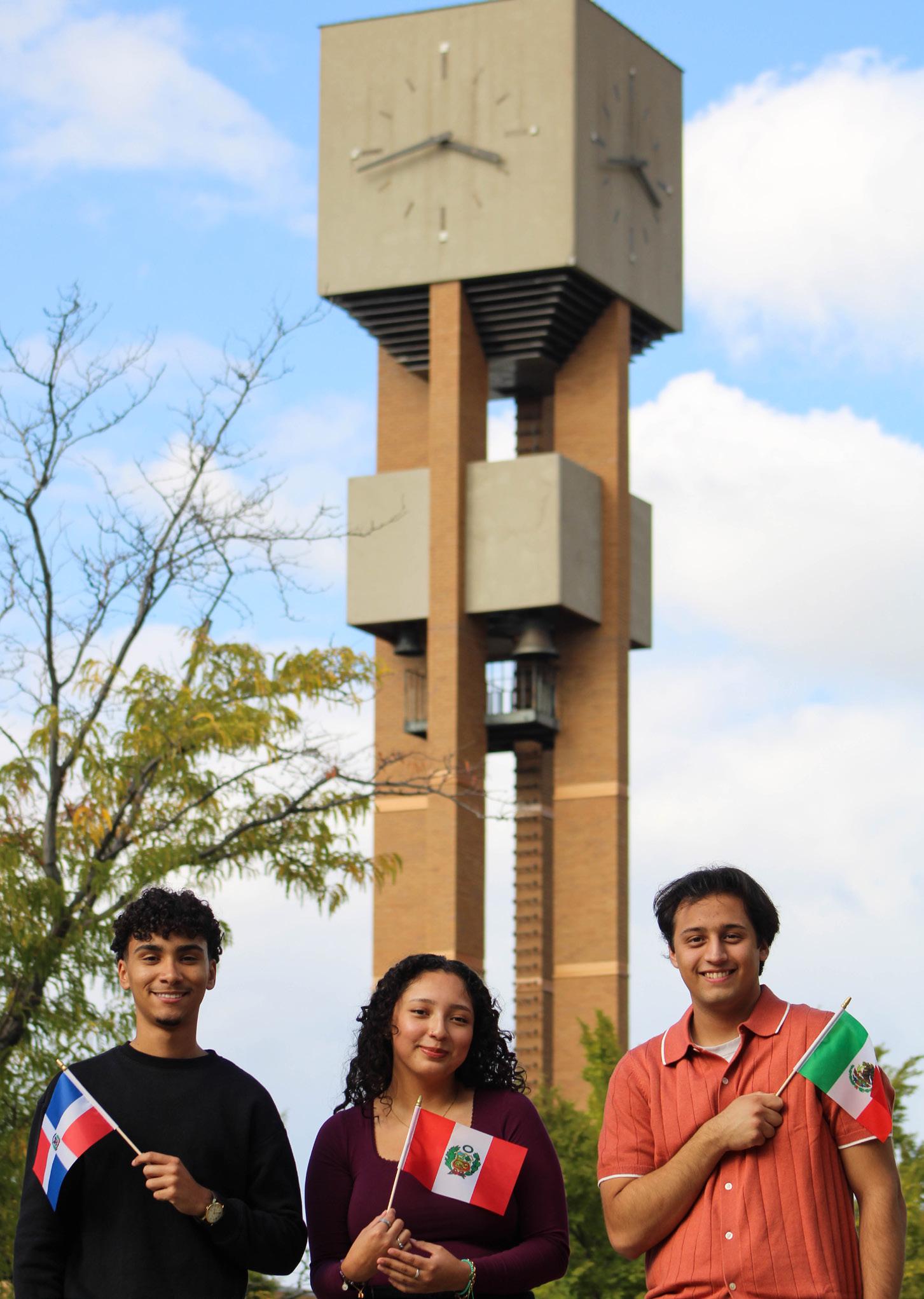
By A.J. HANDLEY Co-Editor
Avanza 88.3 is Utah’s first bilingual radio station, providing music and news in both English and Spanish to its listeners. On Oct. 2, Avanza celebrated its launch with a large party in downtown Salt Lake City. The launch was scheduled to coincide with National Hispanic and Latino Heritage Month. Live music from local jazz artists and DJs filled the outdoor patio of the Drift Lounge, while free drinks and desserts were passed out to guests. Karlysue y Trios Los Charros, a mariachi band, serenaded people as they waited for the party to begin.
The Program Director of Avanza, Edgar Zuñiga, gave the opening remarks to the launch party crowd. Zuñiga is a two-time Emmy-winning bilingual journalist and a University of Utah graduate. “This is just the beginning. We’re going to be expanding our signal up to Ogden before the end of the fall. And we’re gonna have an Avanza app in just a few weeks.” Zuñiga told the crowd as they raised a toast.
Avanza aims to do more than just entertain its listeners. With a long history as a public radio station, Avanza’s programmers aim to foster a sense of community through news updates and music for their listeners. A daily and weekly schedule can be found on their website, avanzautah.org, along with information on upcoming community events.
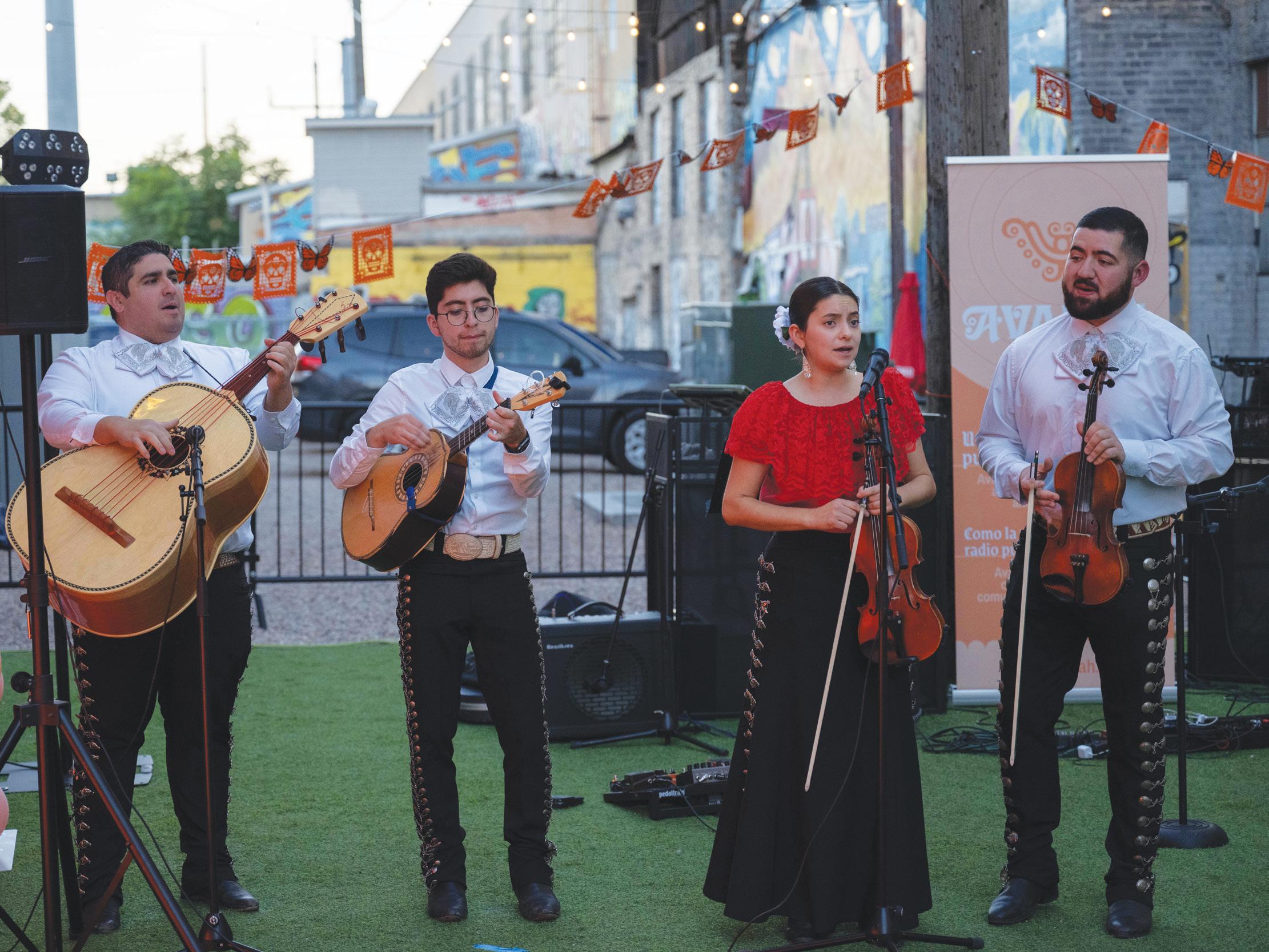
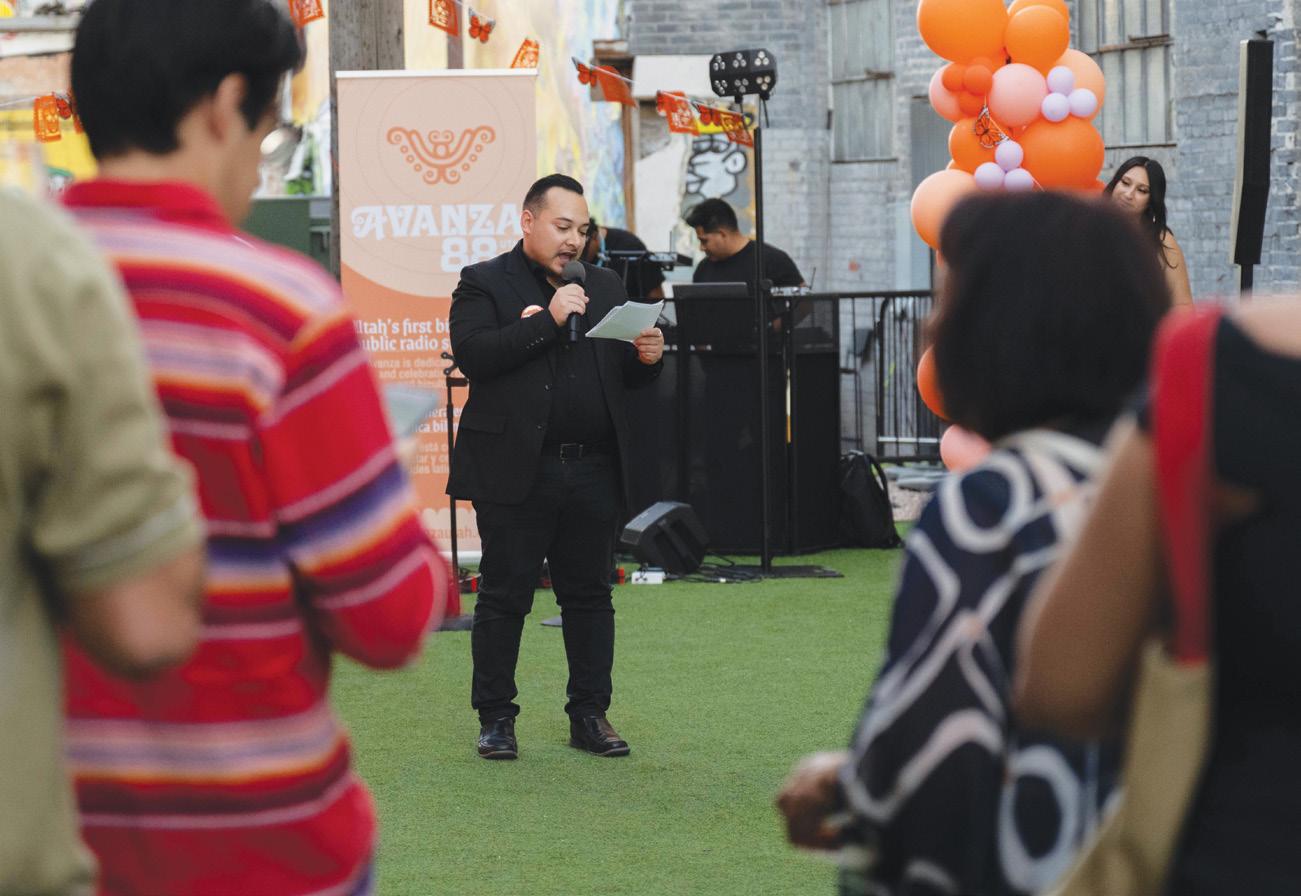
TOP: Karlysue y Los Charros, a local Mariachi Band, opened the event as the first live performance of the evening.
BOTTOM LEFT: Emmy Award-winning journalist and Program Director for KUUB, Edgar Zuniga, gave a commencement speech and thanked guests at the launch party.
BOTTOM RIGHT: Jazzy Olivo is a Dominican-American Jazz singer based out of Salt Lake City.
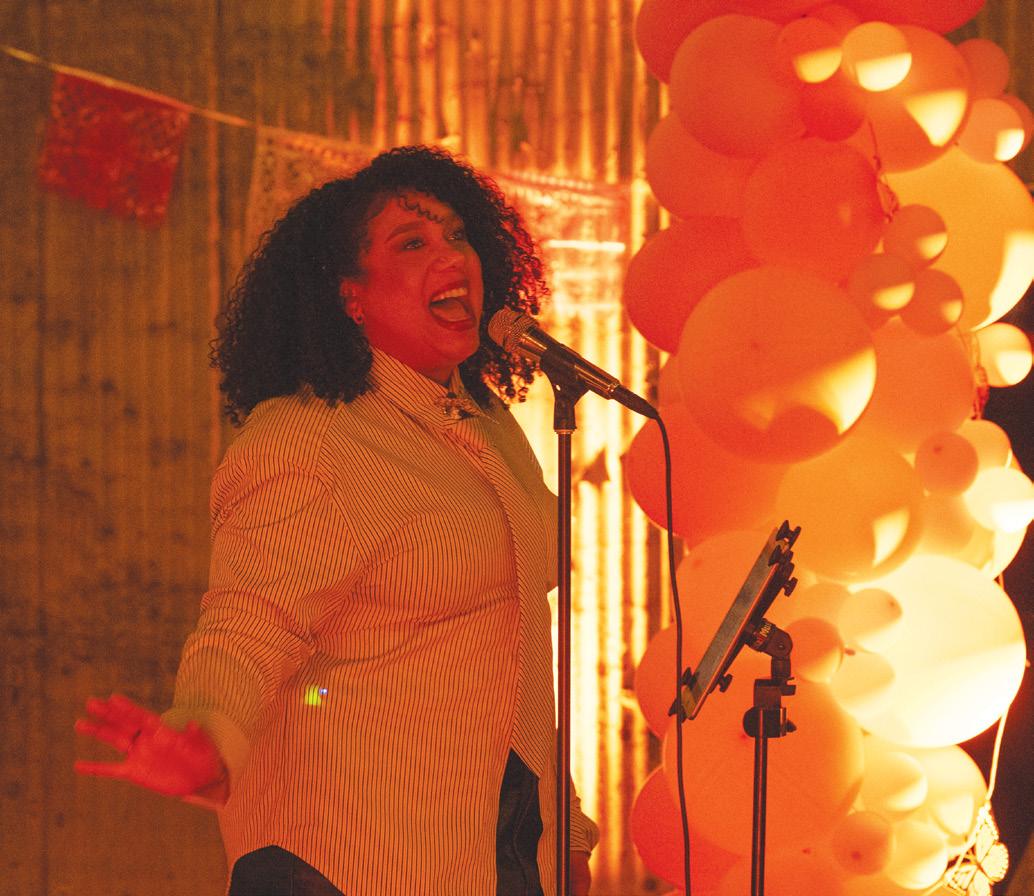
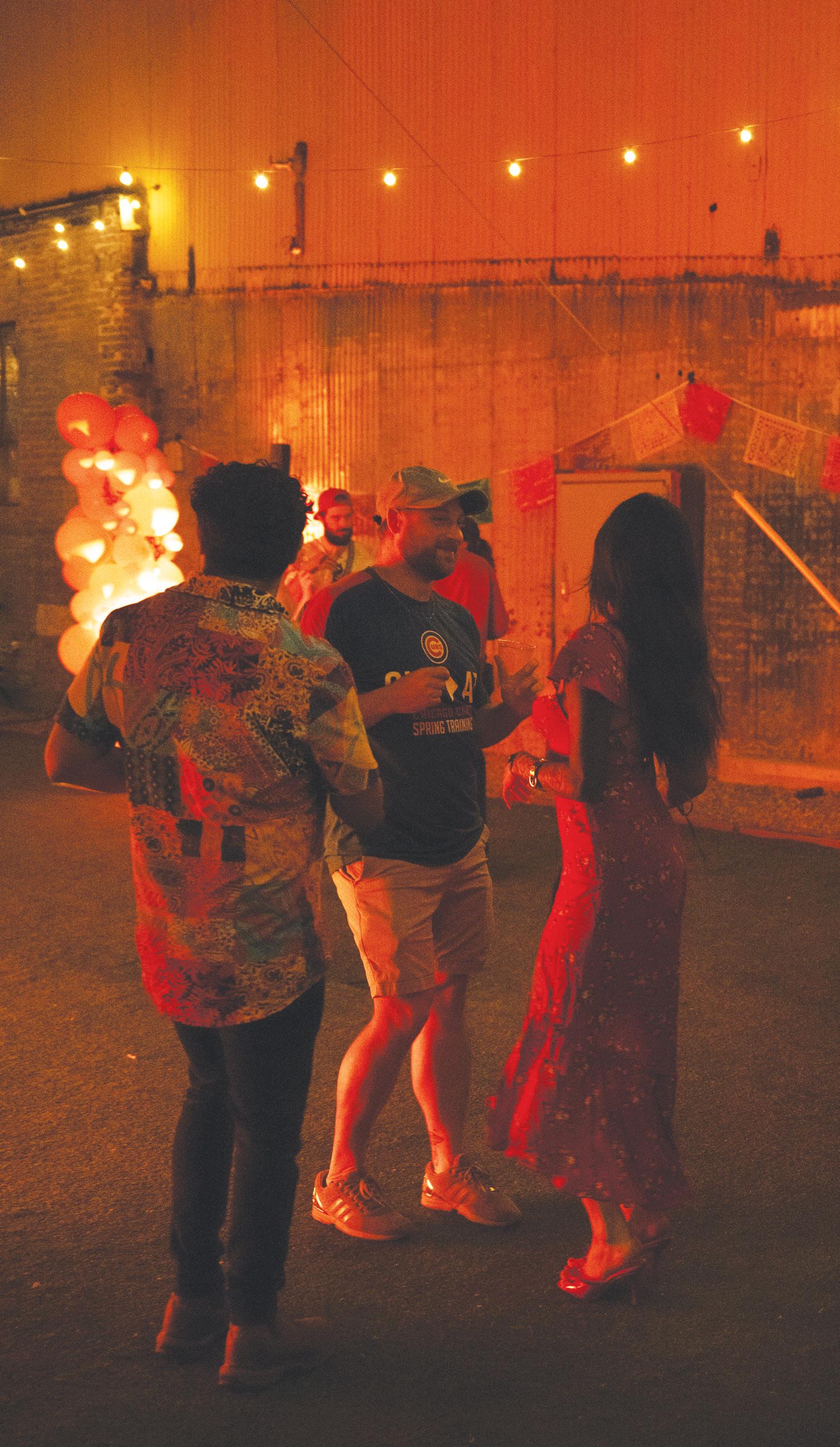

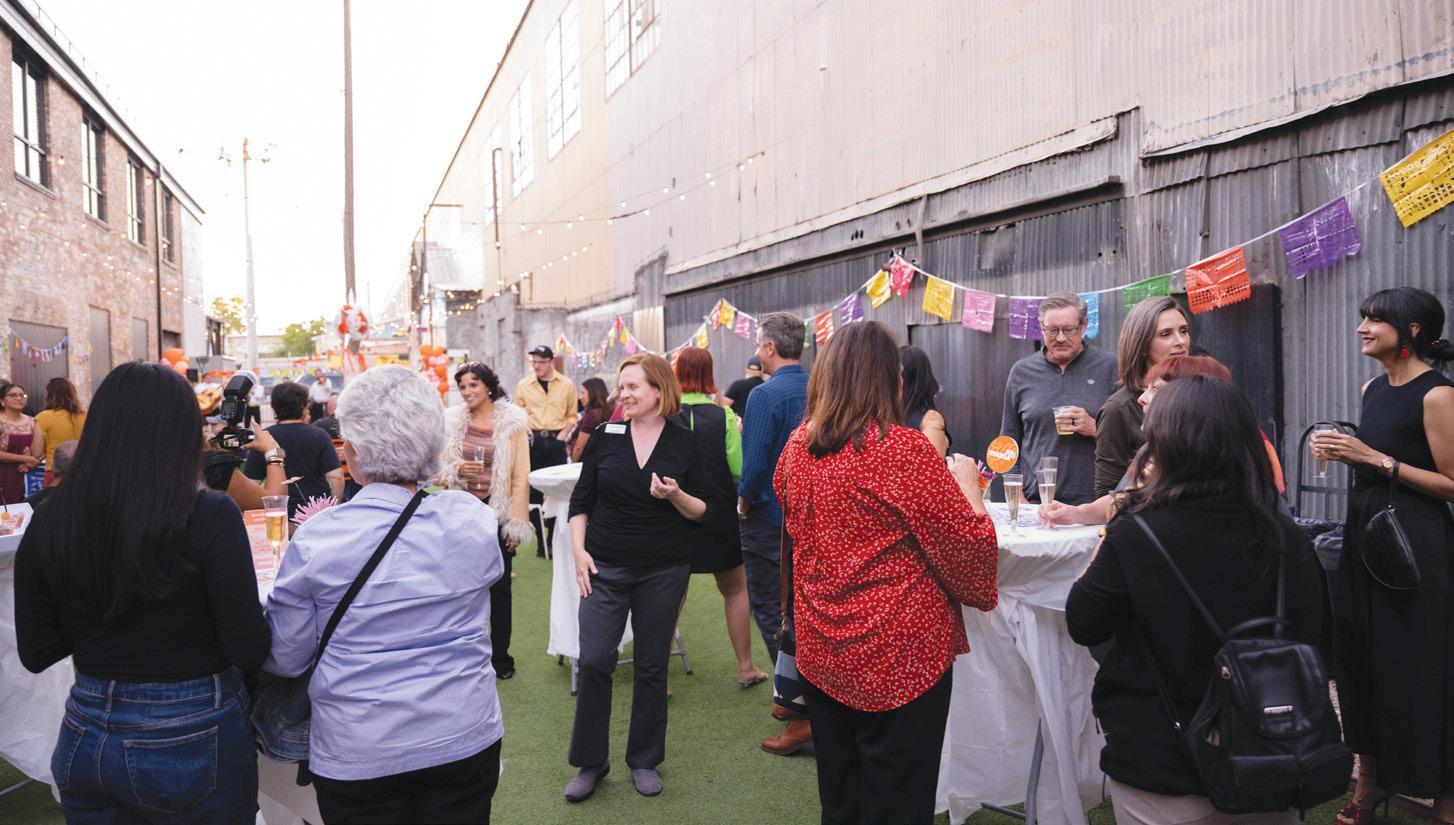
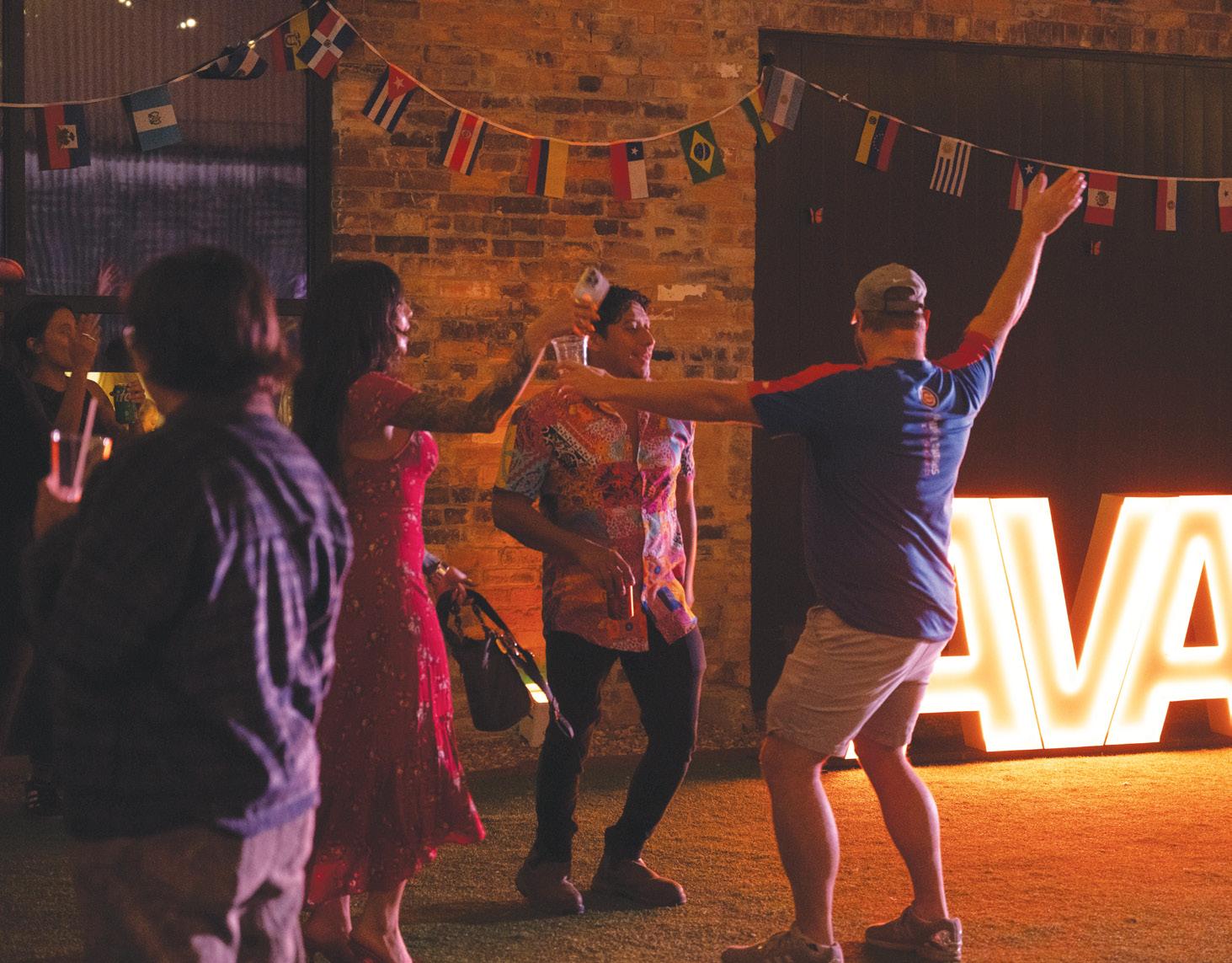
Por VICTORIA HERNANDEZ Co-Editora
Historia y Fotos
Por A.J. HANDLEY
Co-Editor
Avanza 88.3 es la primera estación de radio de Utah que es bilingüe, provee música y noticias en Español e Inglés. El 2 de octubre, Avanza celebró su lanzamiento con una gran fiesta en el centro de Salt Lake City. El lanzamiento se programó para coincidir con el Mes Nacional de la Herencia Hispana y la Latina. La música en vivo de artistas locales de jazz y DJ llenó el patio al aire libre del Drift Lounge, mientras que se repartieron bebidas y postres gratis a los invitados. Karlysue y Trios Los Charros, una banda de mariachis, amenizó a los asistentes mientras esperaban el comienzo de la fiesta. El director del programa Avanza, Edgar
Zuñiga, pronunció el discurso de apertura antes los asistentes en la fiesta de lanzamiento. Zuñiga es un periodista bilingüe que ganó dos premios Emmy y es graduado de la Universidad de Utah. “Esto es solo el comienzo. Vamos a ampliar nuestra señal hasta Ogden antes de que termine el otoño. Y en unas semanas tendremos una aplicación de Avanza”, dijo Zuñiga a los asistentes mientras brindaban.
Avanza quiere ser más de un medio de entretenimiento para sus oyentes. Con una larga historia como una estación de radio pública. Programadores de Avanza tienen como objetivo fomentar el sentido de comunidad a través de noticias y música para su audiencia. En su sitio web, avanzautah.org, se puede consultar la programación diaria y semanal, junto con información sobre los próximos eventos de la comunidad.
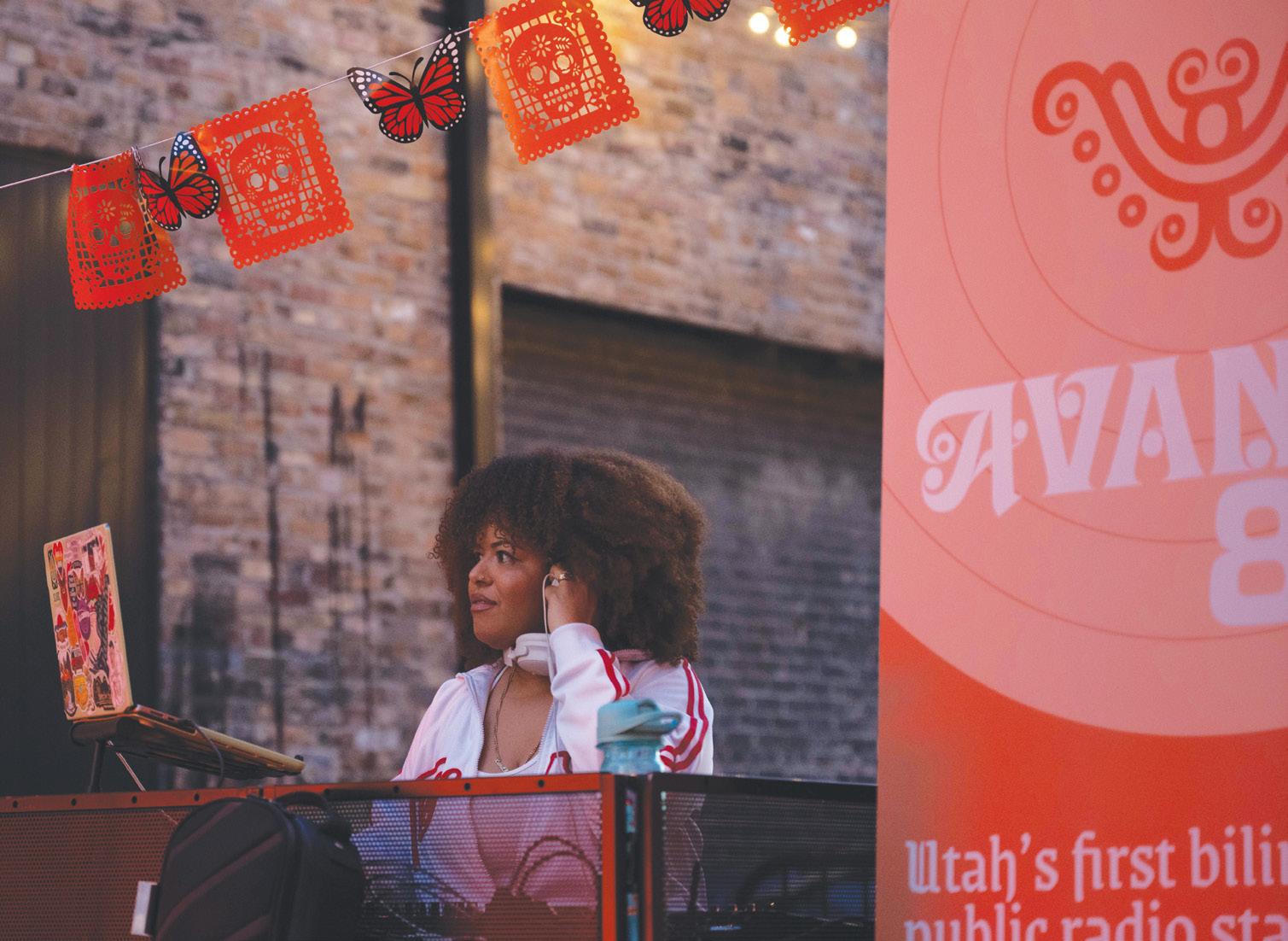
IZQUIERDA: DJ Causita, la DJ local mantuvo a la multitud entretenida con Reggaeton y Afrobeats en medio de las persentaciones.
ARRIBA A LA DERECHA: Un tiquete para bebidas fue complementario a el etiquette de entrada por medio del evento.
ABAJO A LA DERECHA: Samuel Pereyra (izquierda) toca el guitarron mientras Gustavo Castillo (derecha) plays Vihuela.
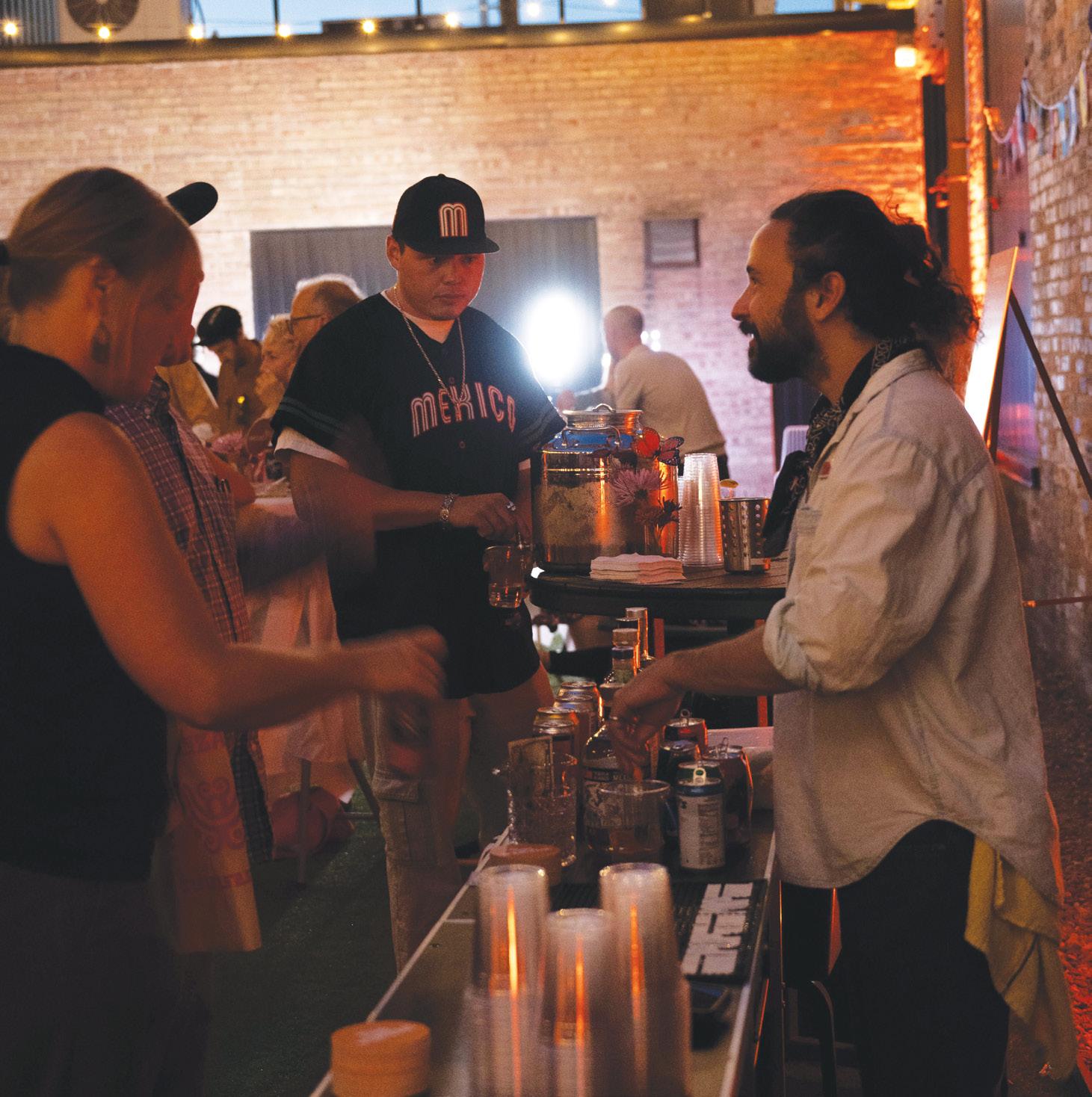
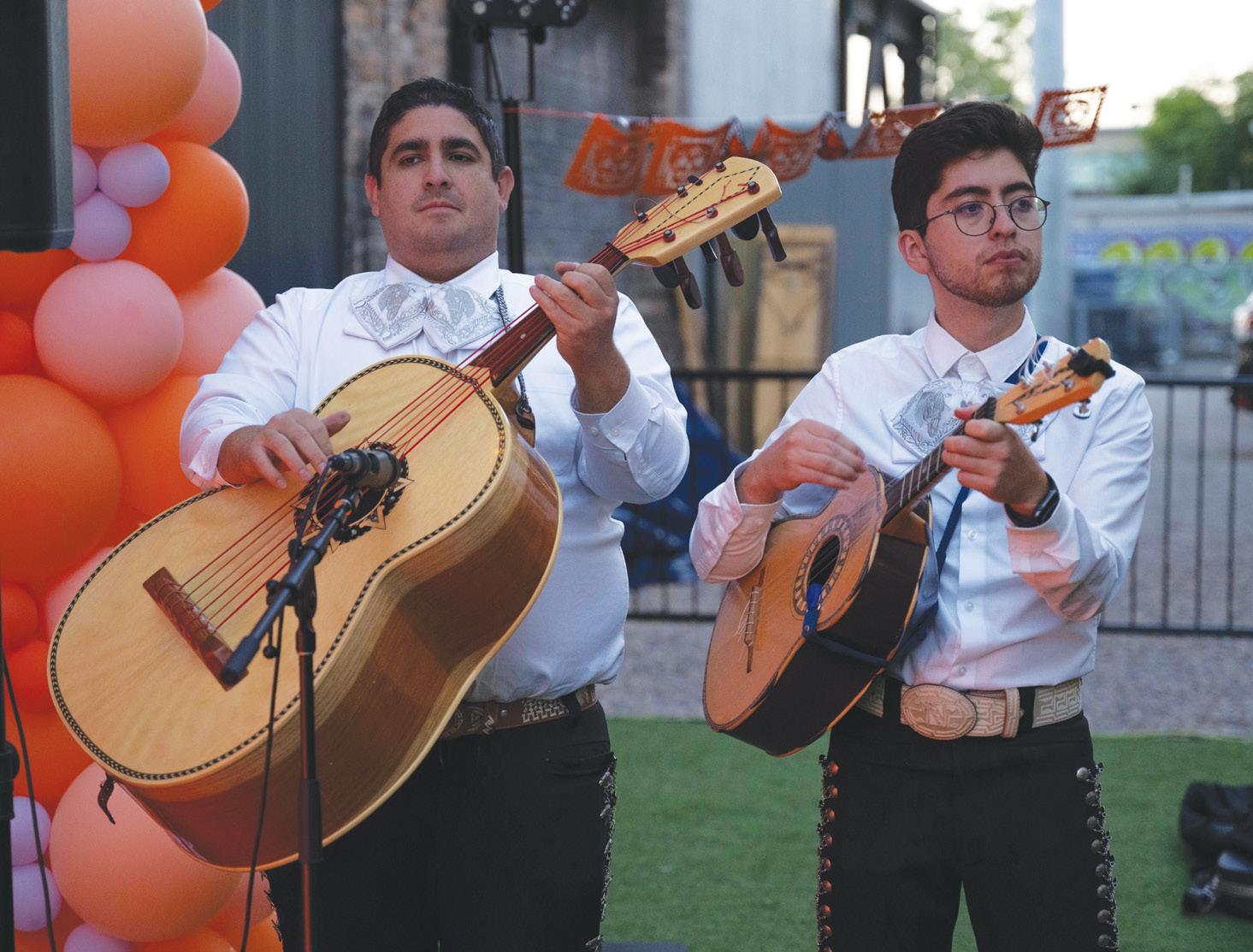
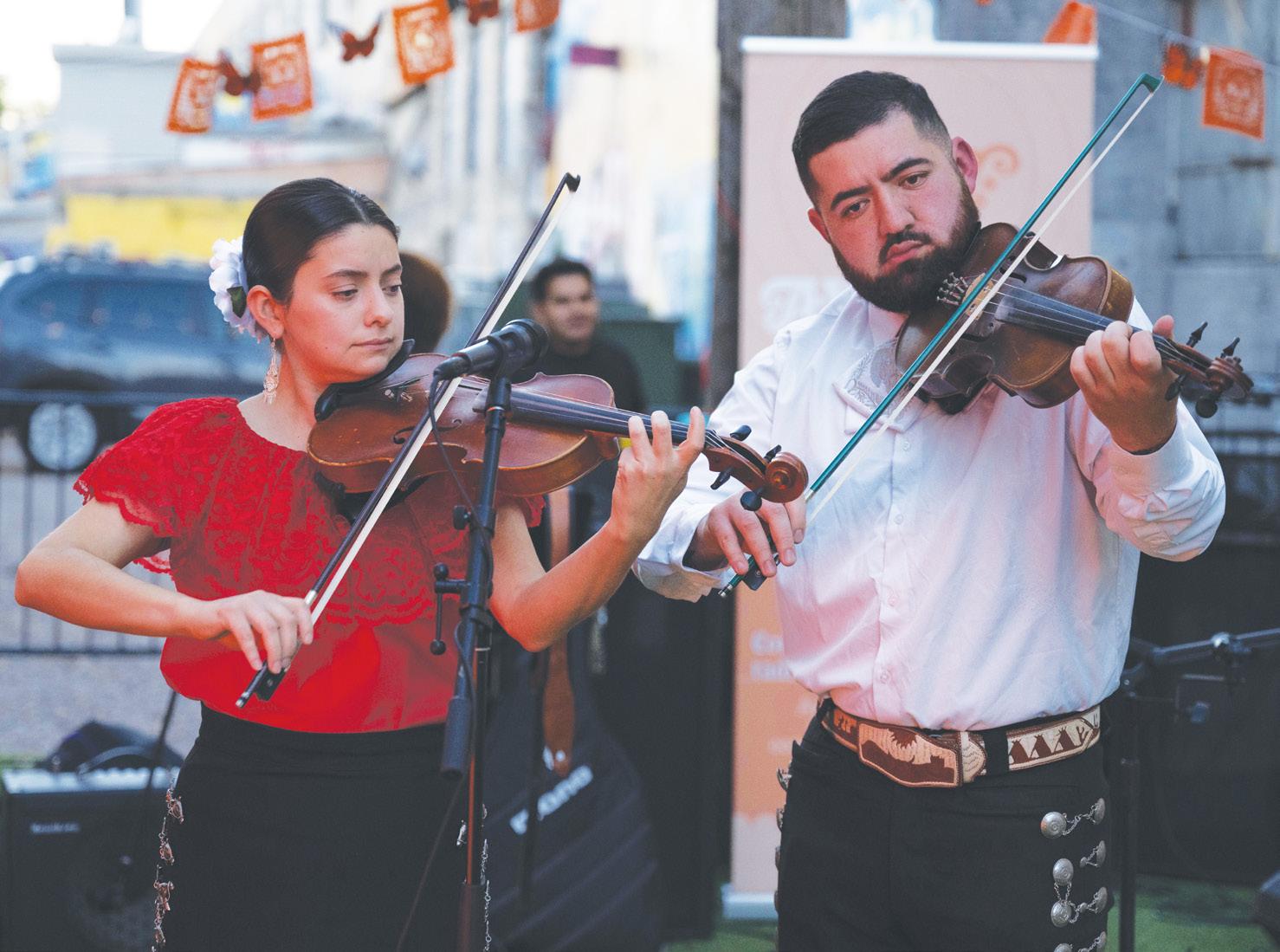
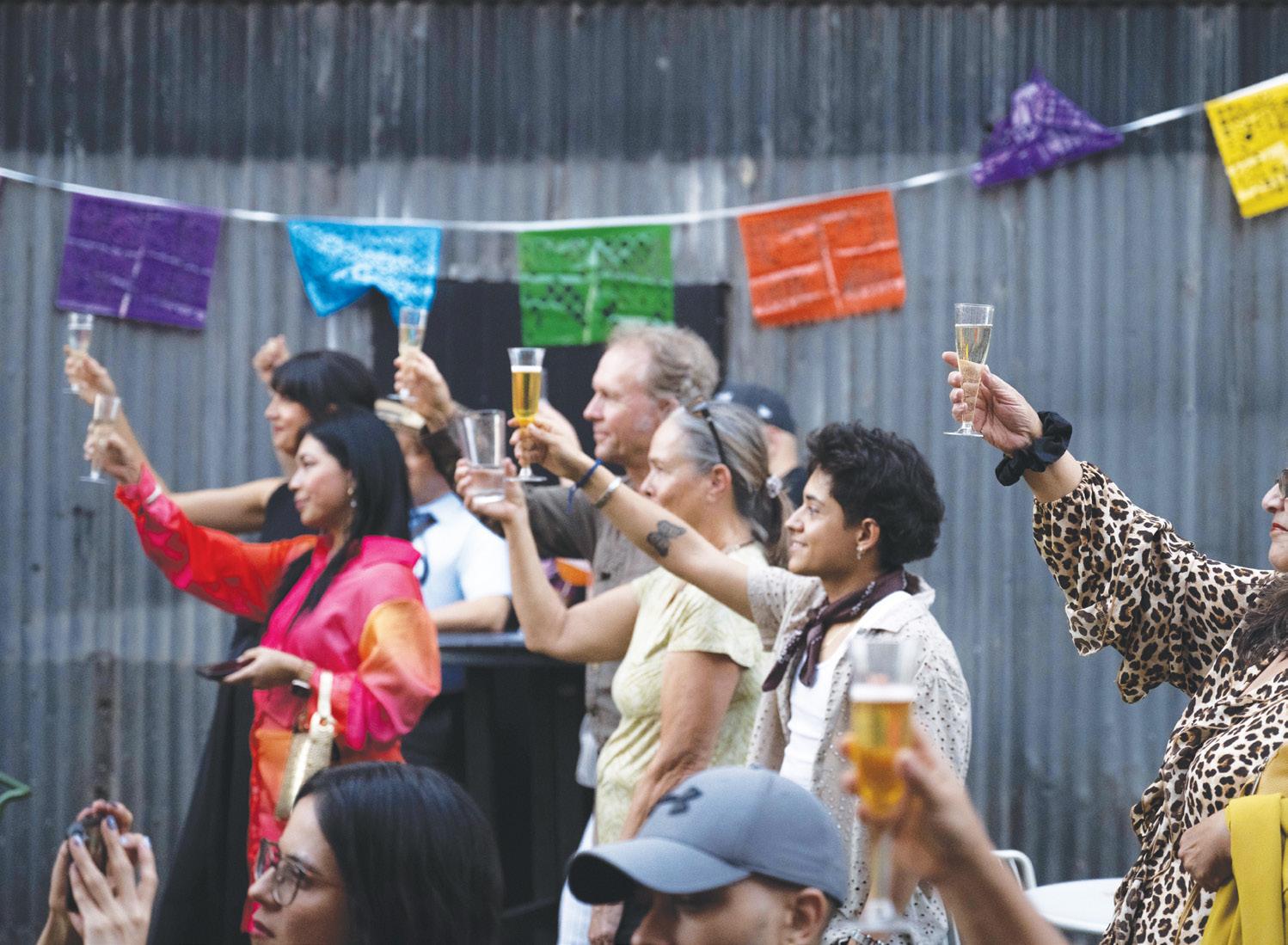
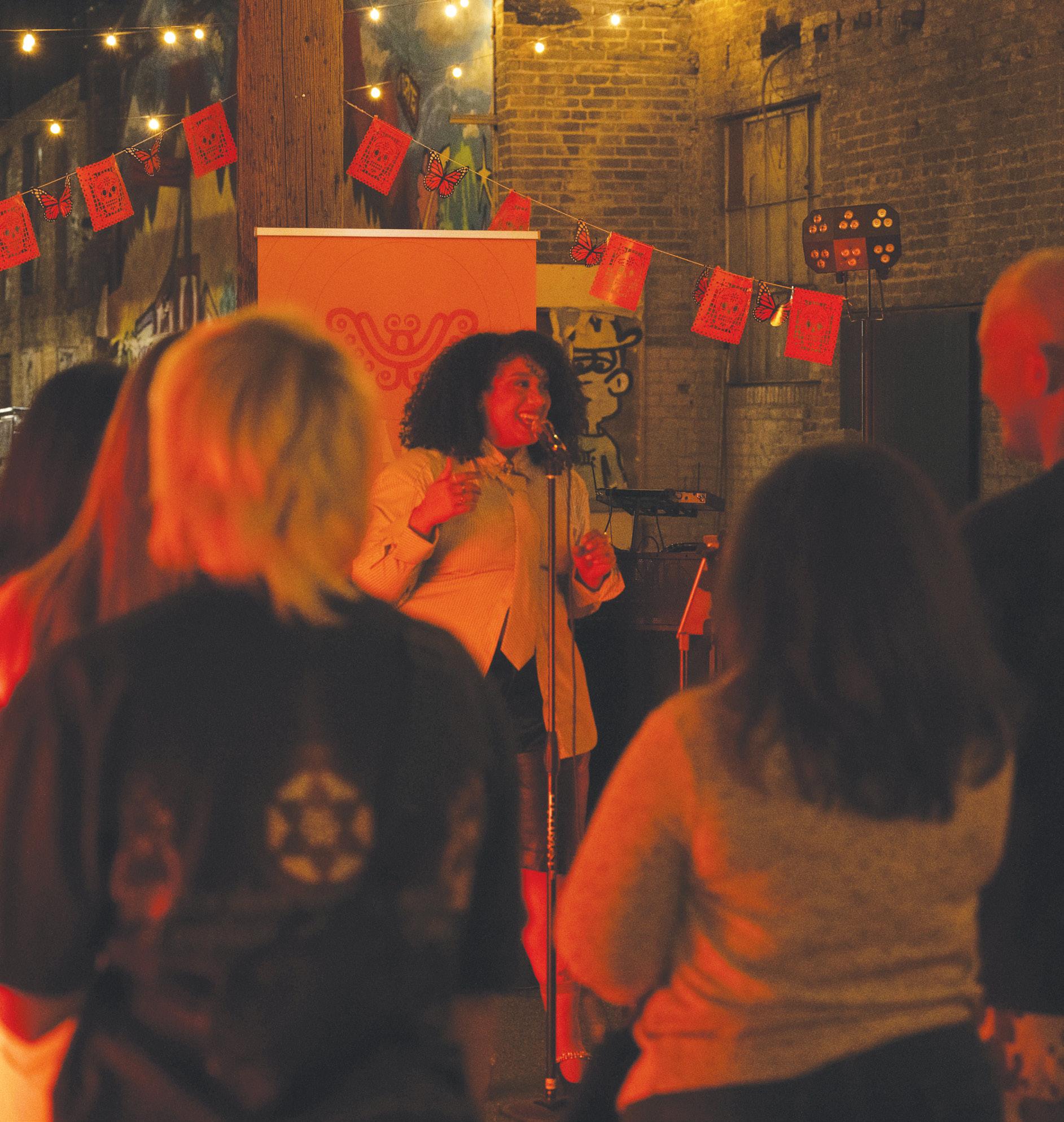
ARRIBA A LA IZQUIERDA: Samuel Castillo (Derecha) y Karlysue Pereyra (Izquierda) ambos tocan el violin para la banda. Pero Pereyra también provee las vocales.
ARRIBA A LA DERECHA: Todos los que atendieron levantaron su champaña para hacer un brindis al lanzamiento.
ABAJO A lA IZQUIERDA: Con musica en vivo, comida y bebidas, just con una cabina interactiva, la fiesta de lanzamiento de Avanza fue una celebración en comunidad.
ABAJO A LA DERECHA: Avenza estara disponible para la audiencia del norte de Utah antes del final del 2025.
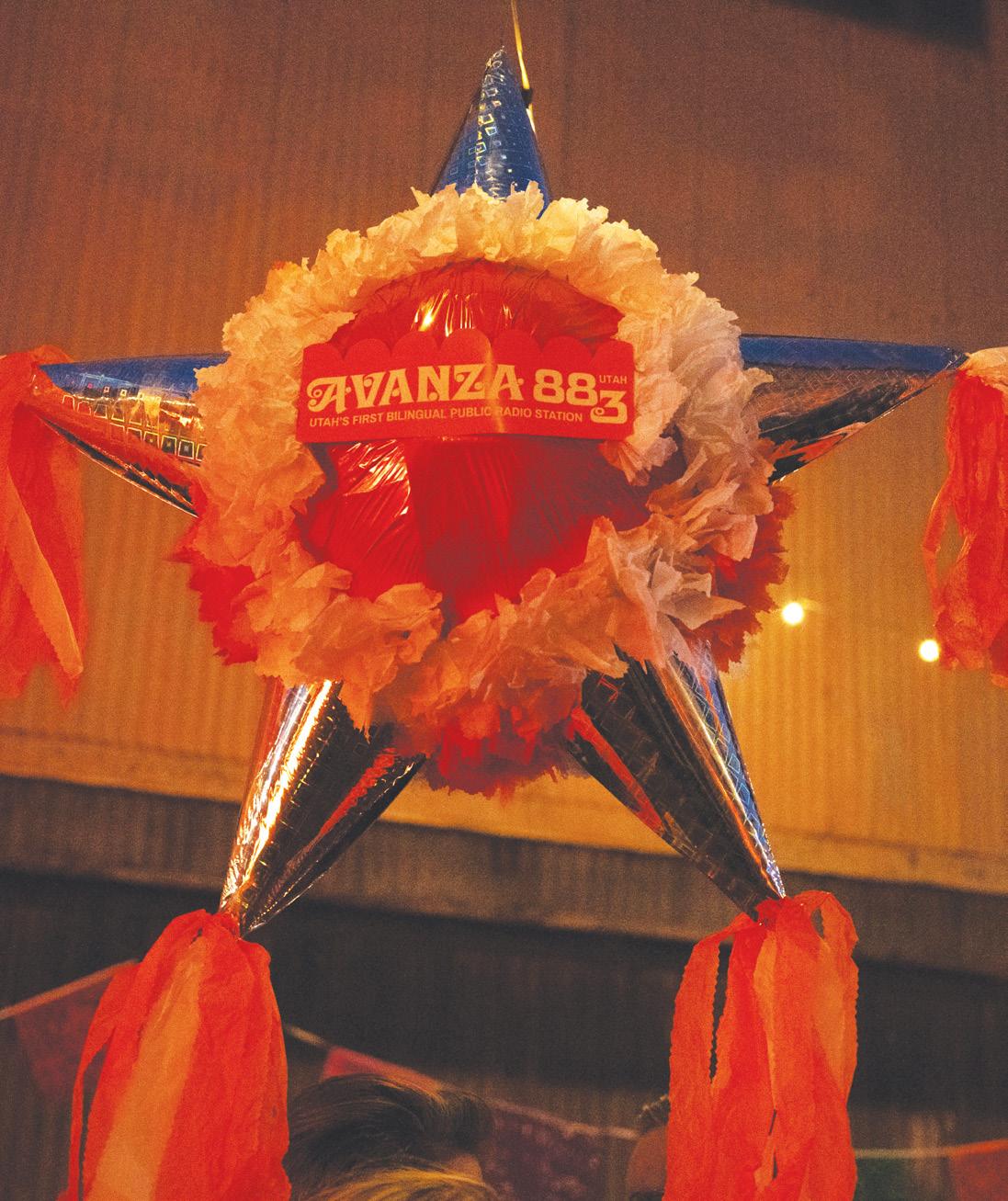
By ALFONSO RUBIO Editor
By JARED MITCHELL Editor
By JAMES GORDON Editor
By KYLE GREENAWALT Reporter
After the cancellation of the 27th annual Unity Conference, The Wildcat Collective, a branch of the American Federation of Teachers Utah College Council, organized an alternate conference on the front steps of Stewart Library.
Organizers contacted Weber State University Police before the event as a precaution, ensuring public safety.
Barret Bonella, the chief steward of The Wildcat Collective, said regardless of legality, he wanted to make sure original participants still had an opportunity to speak.
“The rain hit us hard, but people were still willing to stay for it. That’s encouraging to me,” Bonella said. “People really wanted to hear and be a part of this.”
At approximately 11 a.m., rain began to pour and proceeded throughout the event. The Wildcat Collective worked with police to accommodate a temporary space indoors for the conference to be held in the event of turbulent weather.
The event, organizers named “Unity Conference: Uncensored version,” included open-mic opportunities and speeches, featuring presenters from the original canceled conference. A crowd of approximately 50 people attended the event, as the speakers discussed a wide range of topics on book banning and limitations of censorship of scientific research and papers.
After persistent rainy weather, organizers paused the conference and moved to a lecture room in Lindquist Hall where attendees were told discussions must adhere to topics under HB 261. At this point, the event shifted to small-group discussions.
“It’s wild to me to be living out this censorship in real-time,” Stacy Bernal, a Weber State Alumni and member of the Ogden School Board said. “To be just someone watching it as it was coming up in the news and on social
media, I just truly couldn’t believe it.”
Since the cancellation, Weber State has felt scrutiny from panel members, staff, community members and students.
In an email sent from the Weber State president’s office to faculty and staff, the administration addressed the cancellation, citing poor communication and unclear definitions of HB 261.
“We recognize that this has been difficult to navigate and that there have been times when communication could have been clearer,” the administration wrote in the email.
“We apologize for the frustration this has caused. We are truly working to move forward, through what has sometimes been shifting guidance, together.”
The statement went on to cover the distinction between academic and non-academic settings, and what is permitted to be discussed in the respective setting. Faculty are free to teach, conduct research, join scholarly events and discuss complex or controversial issues in their field, the administration said in the email.
HB 261 restricts how certain topics — such as anti-racism, bias, critical race theory, oppression, intersectionality, discriminatory practices, systemic bias or personal identity characteristics — can be addressed in non-academic programs.
Faculty have academic freedom protections that cover their teaching and research in their discipline, and their participation in scholarly events. This means they may engage in critical analysis, present findings and discuss complex or controversial issues tied to their disciplines.
However, Student Access and Success, the department the unity conference was programmed under, does not fall under these protections. Meaning, certain discussions do not abide under HB 261.
“Because of this difference, some proposed Unity Conference sessions were better suited for academic venues, while others raised compliance concerns because this was a conference hosted by Student Access & Success,” the email stated. “The conference committee ultimately decided to cancel the event after several presenters withdrew.”
Organizers decided to cancel the conference after multiple presenters did not feel comfortable presenting within the limita-
tions of the SAS held program, Oyler said.
When asked for comment, conference organizers said all requests were being directed to an email: weberstateuniversity@weber. edu.
Richard Price, a political science professor at Weber State and an original panelist who was to speak at the canceled unity conference, said that while in theory HB 261 shouldn’t affect their teaching the reality is that there’s no way the bill won’t impact the teaching taking place in Utah’s universities.
The bill doesn’t currently restrict what Price can teach in their own academic discipline, but Price said Utah is only a few years behind other states that do restrict what professors can teach in their own classrooms.
“Texas Tech, which is one of the three major university systems of Texas, just prohibited all of their faculty from talking, instructing, mentioning transgender existence and told them that they’ll be fired,” Price said. “We’re not there yet, but they would be happy if I stopped talking about it because if a student complains, they’re going to have to deal with it, even though this law does not apply to my teaching.”
However, HB 261 does restrict what Price can say to a general campus audience.
“I could teach what I want in theory within the confines of my academic discipline, which is what I do,” Price said. “But I can’t talk to a general audience on campus about it because they start to worry that looks like the university endorsing what I’m saying.”
Last fall Price gave a talk on LGBTQ history and received pushback from the administrators. According to Price, the administrators only had access to the title of their talk which was “LGBTQ Education and Higher Ed”.
“The perspective that administrators are taking essentially are that anything that references groups of people, whether it’s queer people, Black History Month, whatever, can’t be done because it might piss off a legislator,” Price said.
Price said that some sideffects of HB 261 and the culture it’s instilling within administrators was cutting certain educational programs. Price said that the explanation of efficiency given by administrators was a way to cover up cutting programs they didn’t like.
“Women and gender studies, including queer studies got cut despite the fact that
they cost virtually nothing to the university,” Price said. “Under the rubrics that they were using to evaluate programs, it should not have been cut, but it was because they knew the legislature wanted them to be.”
Price stated that on paper HB 261 tries to stop teachers from telling students that their moral worth is tied to their identifying factors, but in practice the bill has a very different outcome.
“What they take it to mean is don’t talk about queer people, don’t talk about black folk, just talk about Americans,” Price said. Price said that everyone’s experiences are important to talk about and each can enrich the full story of the human experience. Price worries that HB 261 sets a false standard regarding the exploration stories from minority communities.
“The assumption is anything that studies a minority is judgmental against whatever the majority is. If I’m teaching queer history, it must be because I hate straight people,” Price said. “The fact that doesn’t reflect any kind of reality of my classes, straight students have taken the class and survived.”
In their final remarks of the email, the administration said they plan to discuss the situation further within faculty senate and staff advisory council meetings. They went on to say that additional questions brought directly to them will be addressed, regarding HB 261 and institutional neutrality, in the coming weeks.
TOP: Social Work Professor Barrett Bonella speaks on Friday to an audience that had moved to Lindquist Hall because of rain at the Unity Conference: Uncensored, an event organized to protest the cancellation of the Unity Conference on censorship.
BOTTOM: A crowd of about 50 applaud Friday afternoon at Weber State University as speeches continue at the Unity Conference: Uncensored. The event was moved to Lindquist Hall because of rain, and the audience grew as the crowd moved toward the building.
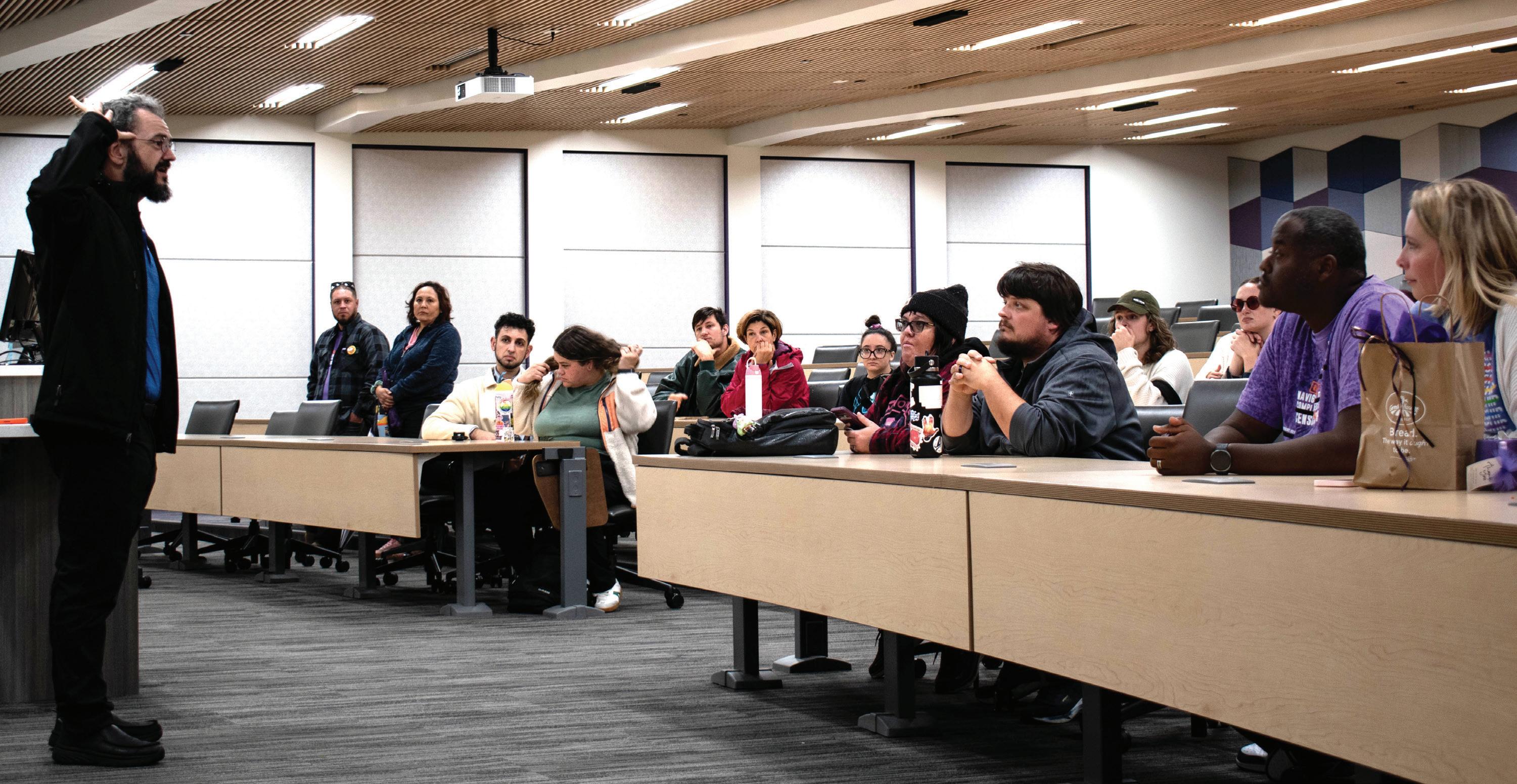

Por
VICTORIA HERNÁNDEZ Co-Editora
Por ALFONSO RUBIO
Editor
Por JARED MITCHELL
Editor
Por JAMES GORDON
Editor
Por KYLE GREENAWALT
Reportero
Después de la cancelación de la 27.ª Conferencia Anual de la Unidad, el Wildcat Collective, una rama del Consejo Universitario de Utah de la Federación Americana de Profesores, organizó una conferencia alternativa en las escaleras de la biblioteca Steward. Los organizadores contactaron a la policía de la Universidad de Weber State antes del evento por precaución, asegurando la seguridad del público.
Barret Bonella, la administradora principal de Wildcat Collective dijo que, independientemente de la legalidad, quería asegurarse de que los participantes originales siguieran teniendo la oportunidad de expresarse.
“La lluvia nos golpeó con fuerza, pero la gente seguía dispuesta a quedarse. Eso me anima”, dijo Bonella. “La gente realmente quería escuchar y formar parte de esto”.
Aproximadamente a las 11 de la mañana, había un diluvio y procedió durante el evento. Wildcat Collective trabajó con la policía para acomodar un espacio interior temporario para la conferencia en caso de mal tiempo. El evento, llamado por los organizadores “Conferencia de la Unidad: versión sin censura”, incluyó oportunidades de micrófono abierto y discursos, con presentadores de la conferencia original cancelada. Una multitud de aproximadamente 50 personas asistieron al evento, en el que los presentadores debatieron una amplia gama de temas sobre la prohibición de libros y las limitaciones de la censura de la investigación científica y los artículos científicos.
Después del persistente clima lluvioso, los organizadores pausaron la conferencia y se movieron a una sala de conferencias en Lind-
quist Hall, donde informaron a los asistentes de que los debates debían ceñirse a los temas tratados en la HB 261. En ese momento, el evento pasó a ser un debate en grupo pequeños.
“Me parece una locura vivir esta censura en tiempo real”, afirmó Stacy Bernal, antigua miembro de la Universidad de Weber State y miembro de la Junta Escolar en Ogden. “Como simple espectadora de lo que se estaba publicando en las noticias y en las redes sociales, realmente no podía creerlo”.
Desde la cancelación, la Universidad de Weber State ha sido objeto de escrutinio por parte de los miembros del panel, el personal, los miembros de la comunidad y los estudiantes.
En un correo electrónico enviado desde la oficina del presidente de la Universidad de Weber State al personal docente y administrativo, la administración abordó la cancelación, citando la mala comunicación y las definiciones poco claras de la ley HB 261.
“Reconocemos que ha sido difícil manejar esta situación y que ha habido momentos en los que la comunicación podría haber sido más clara”, escribió la administración en el correo electrónico. “Pedimos disculpas por la frustración que esto ha causado. Estamos trabajando sinceramente para avanzar juntos, a través de lo que a veces han sido directrices cambiantes”.
La declaración continuaba abordando la distinción entre entornos académicos y no académicos, y lo que se permite discutir en cada uno de ellos. El personal docente es libre de enseñar, investigar, participar en eventos académicos y debatir cuestiones complejas o controvertidas en su campo, según indicaba la administración en el correo electrónico.
La ley HB 261 restringe la forma en que se pueden abordar ciertos temas como: el anti racismo, los prejuicios, la teoría crítica de la raza, la opresión, la interseccionalidad, las prácticas discriminatorias, los prejuicios sistémicos o las características de identidad personal, en los programas no académicos.
El cuerpo docente goza de protecciones de libertad académica que cubren su enseñanza e investigación en su disciplina, así como su
participación en eventos académicos. Esto significa que pueden realizar análisis críticos, presentar conclusiones y debatir cuestiones complejas o controvertidas relacionadas con sus disciplinas.
Sin embargo, Student Access and Success, el departamento bajo el que se programó la conferencia de unidad, no está sujeto a estas protecciones. Esto significa que ciertos debates no se ajustan a la ley HB 261.
Debido a esta diferencia, algunas de las sesiones propuestas para la conferencia de unidad eran más adecuadas para foros académicos, sin embargo, otras planteaban problemas de cumplimiento, ya que se trataba de una conferencia organizada por Student Access & Success», se indicaba en el correo electrónico. “El comité de la conferencia decidió finalmente cancelar el evento después de que varios ponentes se retiraran”.
Richard Price, profesor de ciencias políticas en la Universidad Estatal de Weber y uno de los panelistas originales que iba a intervenir en la conferencia sobre la unidad que fue cancelada, afirmó que, aunque en teoría la HB 261 no debería afectar a su labor docente, la realidad es que es imposible que el proyecto de ley no tenga repercusiones en la enseñanza que se imparte en las universidades de Utah.
Actualmente, el proyecto de ley no restringe lo que Price puede enseñar en su propia disciplina académica, pero Price dijo que Utah solo está unos años por detrás de otros estados que sí restringen lo que los profesores pueden enseñar en sus propias aulas.
“Texas Tech, que es uno de los tres principales sistemas universitarios de Texas, acaba de prohibir a todo su profesorado hablar, instruir o mencionar la existencia de las personas transgénero y les ha dicho que serán despedidos”, afirmó Price. “Nosotros aún no hemos llegado a ese punto, pero les encantaría que dejara de hablar de ello, porque si un estudiante se queja, tendrán que ocuparse del asunto, aunque esta ley no se aplique a mi enseñanza”.
Sin embargo, la ley HB 261 sí restringe lo que Price puede decir a una audiencia general del campus.
“En teoría, podría enseñar lo que quisiera dentro de los límites de mi disciplina
académica, que es lo que hago”, dijo Price. “Pero no puedo hablar de ello a una audiencia general en el campus porque empiezan a preocuparse de que parezca que la universidad respalda lo que digo”.
El otoño pasado, Price dio una charla sobre la historia LGBTQ y recibió críticas por parte de los administradores. Según Price, los administradores solo tuvieron acceso al título de su charla, que era “Educación LGBTQ y Educación Superior”.
“La perspectiva que están adoptando los administradores es, en esencia, que cualquier cosa que haga referencia a grupos de personas, ya sean personas queer, el Mes de la Historia Negra o cualquier otra cosa, no se puede hacer porque podría molestar a algún legislador”, dijo Price.
Price mencionó que algunos efectos secundarios de la ley HB 261 y la cultura que está inculcando entre los administradores era el corte de ciertos programas educativos. Price afirmó que la explicación de eficiencia dada por los administradores era una forma de cubrir el corte de los programas que no les gustaban.
“Los estudios sobre la mujer y el género, incluidos los estudios queer, se cortaron a pesar de que no suponían prácticamente ningún coste para la universidad”, afirmó Price. “Según los criterios que utilizaban para evaluar los programas, no deberían haberse cortado, pero se hizo porque sabían que la legislatura quería que así fuera”.
Price afirmó que, sobre el papel, la HB 261 intenta impedir que los profesores le digan a los alumnos que su valor moral está relacionado con sus factores de identificación, pero en la práctica el proyecto de ley tiene un resultado muy diferente.
“Lo que ellos entienden es que no se debe hablar de las personas queer, no se debe hablar de los negros, solo se debe hablar de los estadounidenses”, dijo Price.
Price dijo que las experiencias de todos son importantes y que cada una de ellas puede enriquecer la historia completa de la experiencia humana. A Price le preocupa que la ley HB 261 establezca un estándar falso con respecto a las historias de exploración de las comunidades minoritarias.
“Se parte del supuesto de que cualqui-
historia queer, debe ser porque odio a las personas heterosexuales.” compartió Price. “El hecho es que eso no refleja en absoluto la realidad en mis clases, ya que hay personas heterosexuales que han asistido a ellas y han sobrevivido”.
En sus comentarios finales del correo electrónico, la administración dijo que planea discutir la situación más a fondo en las reuniones del senado y del consejo asesor del personal. Continuaron diciendo que en las próximas semanas se abordarán las preguntas adicionales que se les planteen directamente sobre la ley HB 261 y la neutralidad institucional.
ARRIBA: Profesora asociada de Zoología Elizabeth Sandquist le habla a la multitud de alrededor de 35 personas Weber State University el viernes mientras llueve, la multitud protesta la cancelación de la Unity Conference acerca de las censuras.
ABAJO: Profesor asistente de historia Leah Lagrone le habla a la audiencia acerca de la importancia de luchar en contra de las censuras el viernes en Weber State University.
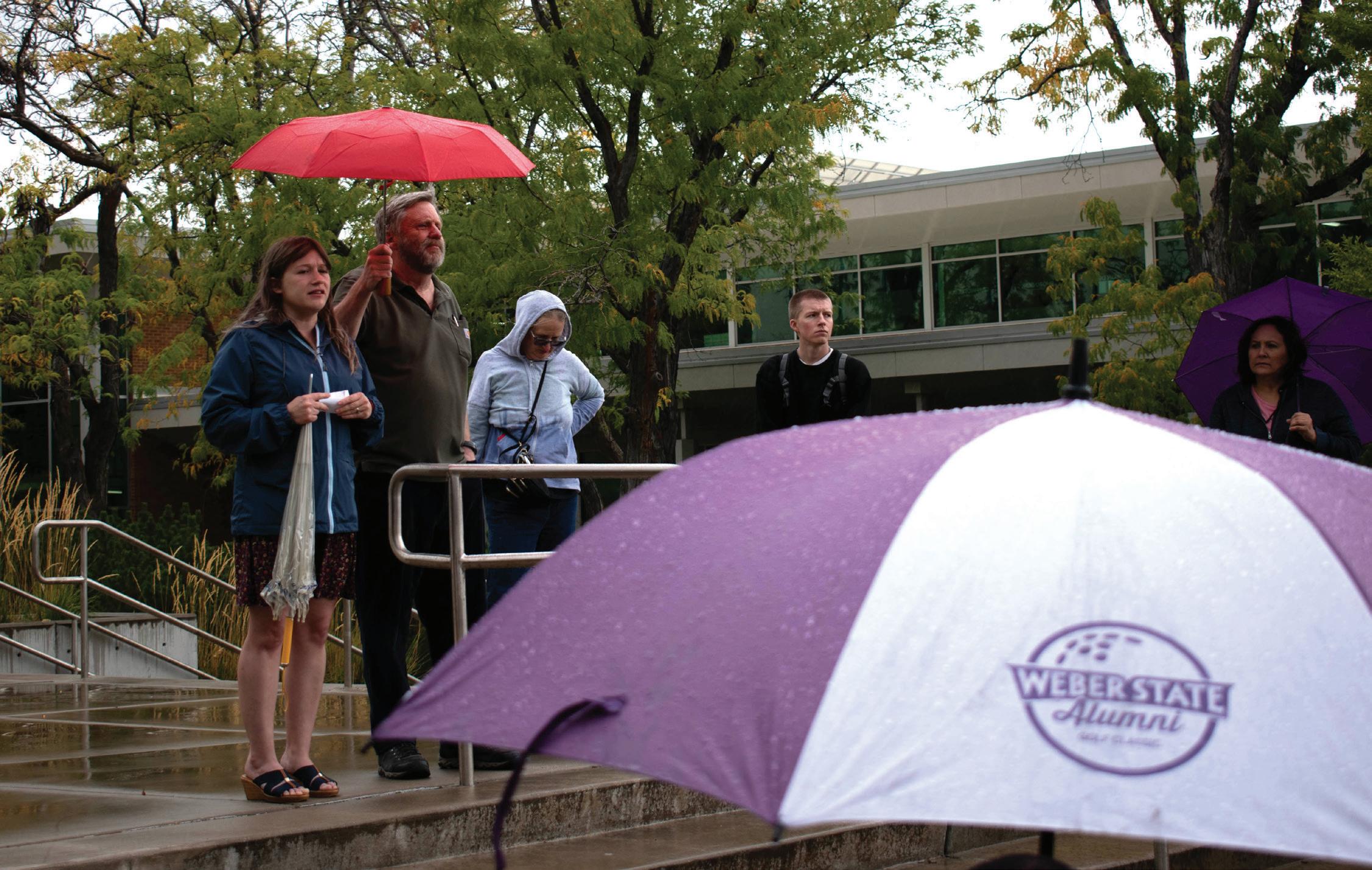
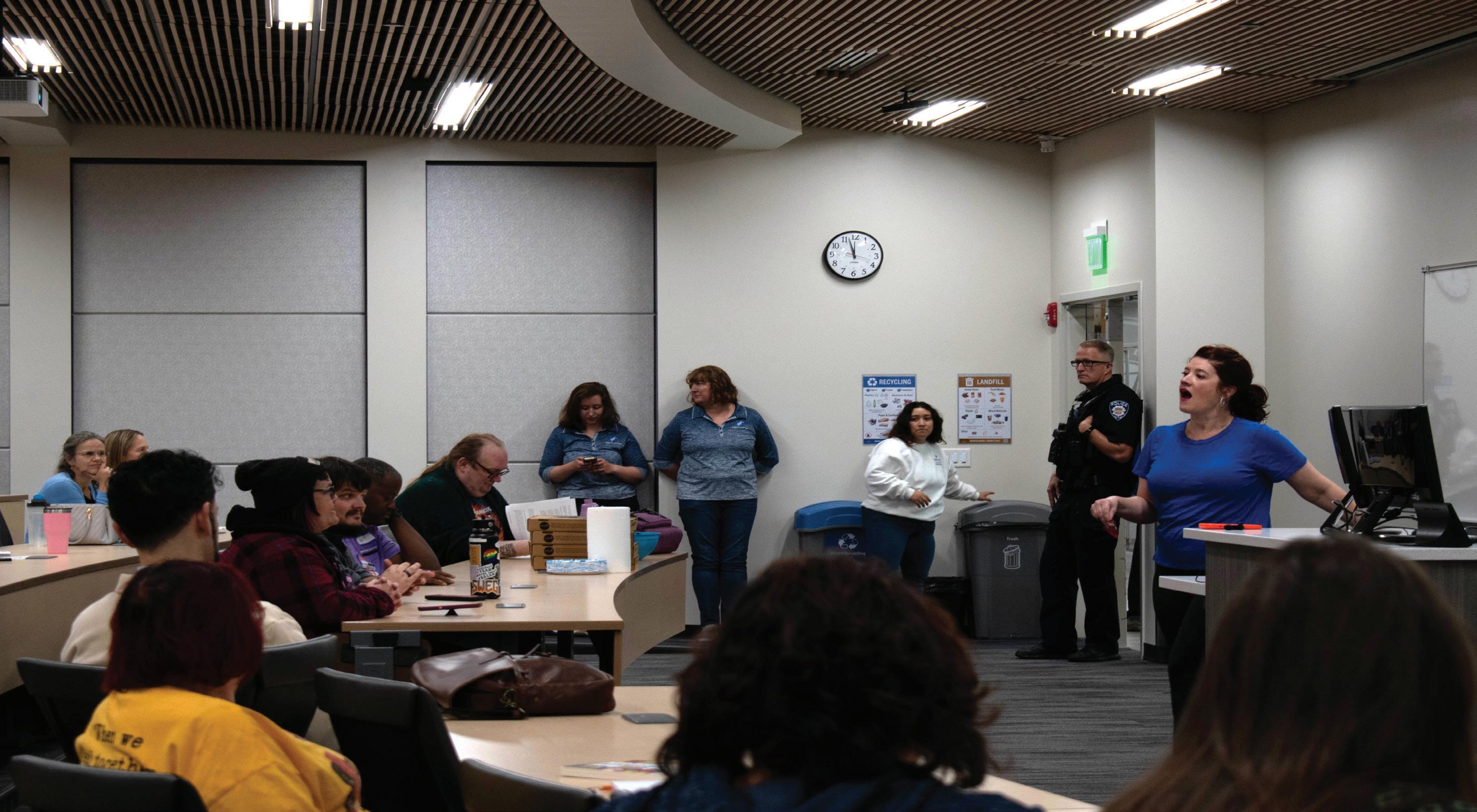
By JARED MITCHELL Editor
By CAEL BLACK Reporter
Don Salazar, the Chairman of the United States Hispanic Business Council’s board, will be the keynote speaker acting as the capstone for Hispanic Heritage Month at Weber State on Oct. 15. He will be speaking about the impact and importance of the Hispanic business community in the United States.
“We’ve been here for hundreds of years,” Salazar said. “We’re impacting the community and contributing trillions of dollars. I think that sometimes we have to wave our own flag to let folks know how important we are to this community and how vital we are to the U.S. economy.”
The U.S. Hispanic Business Council, or US HBC, is an organization focused on com-
merce and business in the United States.
Salazar said the organization’s primary concern is an even playing field for Hispanic businesses in the United States.
US HBC represents the 4.5 million Hispanic owned businesses across the United States and is funded by donors. The US HBC doesn’t take any money from the federal government. Salazar said that their job is to advocate for legislation that helps business owners and being funded by the government could inhibit that cause.
“If we have a Republican administration and they’re doing things that maybe we don’t align with, then it’s our charge to call them on the carpet so to speak,” Salazar said. “But if they’re holding the purse strings and we’re relying on them for our existence then I think that inhibits our strategic thinking, certainly.”
The board that runs US HBC is made up of members of business owners. Salazar said


that this allows for their board members to understand everything that goes into business and advocate for policies accordingly.
“I think the US HBC is critical to maintaining sensible business direction and structure,”
Salazar said.
The organization advocates for various policy priorities including affordable healthcare and child care, fair and strategic trade and a strong immigrant workforce while maintaining a secure border. The council reaches out to politicians on both sides of the political aisle when pursuing its advocacy.
Salazar said that the US HBC utilizes data and statistics when deciding on its policy positions.

“Everything that we say is fact-checked and based on statistics, so we just don’t pull things out of the air,” Salazar said. The council utilizes polling to highlight the perspective of its constituents to politicians or business owners. Salazar said that polling
can push the needle one way or the other and is a powerful tool for their advocacy.
Salazar stated that he believes that the health of business determines the health of the country as a whole. He said that healthy businesses can increase pay for its workers and help fund charities.
“We have to maintain a strong, vibrant business culture in this country and then everybody benefits,” Salazar said.
While the US HBC advocates for Hispanic business owners and focuses on issues impacting those communities, Salazar said that doesn’t erase the bigger picture at play.
“We advocate for the Hispanic business, and we’re proud to be Hispanic businessmen,” Salazar said. “But At the end of the day, we’re more proud to be American businessmen and business people. That’s just what we believe.”






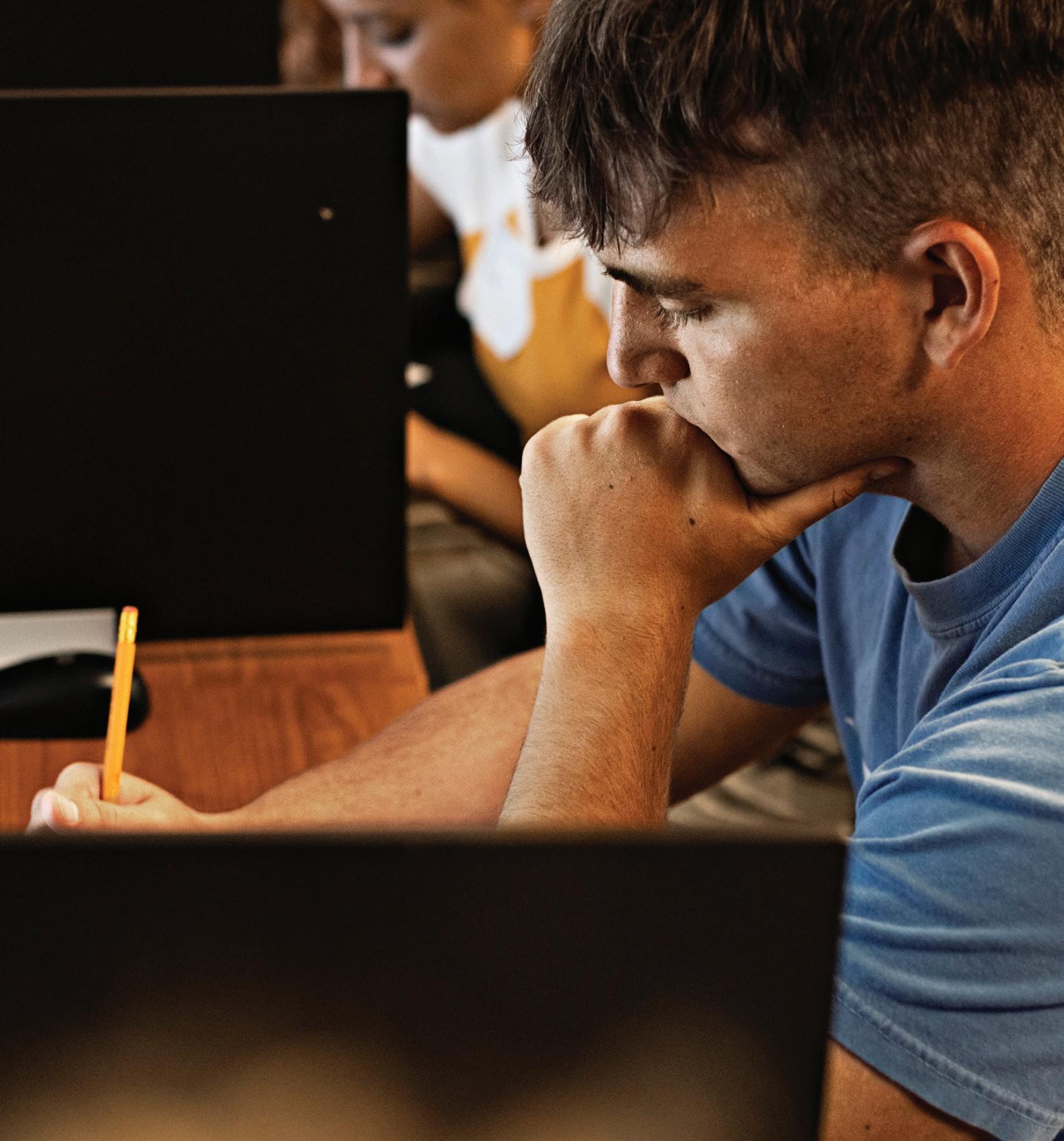
Por
IVANNA OLACHEA GONZALEZ Traductora
Por
JARED MITCHELL Editor
Por CAEL BLACK Reportero
Don Salazar, el Presidente de la junta directiva del Consejo Empresarial Hispano de Estados Unidos, será el orador principal y actuará como pieza clave para el Mes de Herencia Hispana en Weber State el 15 de octubre. Él estará hablando acerca del impacto e importancia de la comunidad empresarial Hispana en los Estados Unidos. “Hemos estado aquí por cientos de años”, dijo Salazar. “Estamos impactando a la comunidad y contribuyendo billones de dólares. Creo que algunas veces tenemos que ondear nuestra propia bandera para que la gente sepa lo importante que somos para esta comunidad y que tan vital somos para la economía de Estados Unidos”.

El Consejo Empresarial Hispano de Estados Unidos, o US HBC, es una organización centrada en comercio y negocio en los Estados Unidos. Salazar dijo que la principal preocupación de la organización es la igualdad de condiciones para los negocios Hispanos en los Estados Unidos.
US HBC representa a los 4.5 millones de negocios propiedad de Hispanos en los Estados Unidos y está financiado por donantes. El US HBC no toma ningún dinero del gobierno federal. Salazar dijo que su trabajo es abogar por una legislación que ayude a propietarios de negocios y estar financiados por el gobierno podría inhibir esa causa.
“Si tenemos una administración Republicana y ellos están haciendo cosas en las que tal vez no estamos de acuerdo, entonces es nuestra responsabilidad llamarlos a la alfombra, por así decirlo”, dijo Salazar. “Pero si están controlando las finanzas y dependemos de ellos por nuestra existencia entonces creo que eso inhibe nuestro pensamiento estratégico, sin duda”.
La junta que dirige US HBC está compuesta por miembros de propietarios de negocios.
Salazar dijo que esto permite a los miembros de la junta directiva entender todo lo que va en los negocios y abogar por políticas acordes con ello.
“Creo que US HBC es crítico para mantener una dirección y estructura empresarial sensata”, dijo Salazar.
La organización aboga por varias prioridades políticas incluyendo atención médica y cuidado infantil asequibles, comercio justo y estratégico y una mano de obra inmigrante sólida mientras se mantiene una frontera segura. El consejo se pone en contacto con políticos de ambos lados del espectro político cuando lleva a cabo su labor de defensa.
Salazar dijo que el US HBC utiliza datos y estrategias al decidir sus posiciones políticas.
“Todo lo que decimos es verificado y basado en estadísticas, así que no sacamos cosas de la nada”, dijo Salazar.
El consejo utiliza encuestas para destacar la perspectiva de sus electores a políticos o
dueños de negocios. Salazar dijo que las encuestas pueden inclinar la balanza hacia un lado u otro y es una herramienta poderosa para su defensa.
Salazar declaró que él cree que la salud de las empresas determina la salud del país en su conjunto. El dijo que negocios saludables pueden aumentar el salario para sus trabajadores y ayudar a financiar organizaciones benéficas.
“Tenemos que mantener una fuerte, dinámica cultura empresarial en este país y entonces todos se benefician”, dijo Salazar. Mientras el US HBC aboga por propietarios de negocios Hispanos y se centra en cuestiones que afectan a aquellas comunidades, Salazar dijo que eso no borra el panorama general que está en juego.
“Nosotros abogamos por los negocios Hispanos, y estamos orgullosos de ser empresarios hispanos”, dijo Salazar. “Pero al final del día, estamos más orgullosos de ser empresarios Americanos y personas de negocios. Eso es justo lo que creemos”.
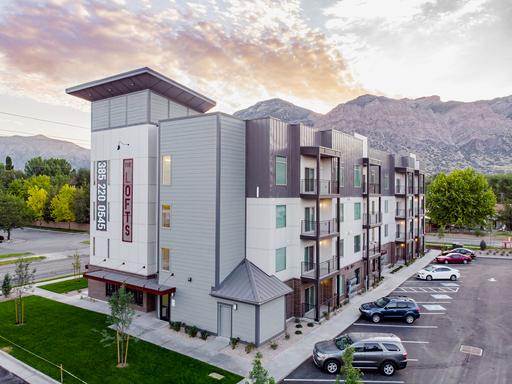
Complete the FAFSA (Free Application for Federal Student Aid) to get money for school including SCHOLARSHIPS, PELL GRANTS, WORK-STUDY and LOANS.
Complete the FAFSA now to ensure your financial aid is ready for fall 2026 - summer 2027 semesters. Priority deadline is April 1.
NEED HELP COMPLETING FAFSA? weber.edu/fafsahelp
FAFSA ONLINE APPLICATION: studentaid.gov
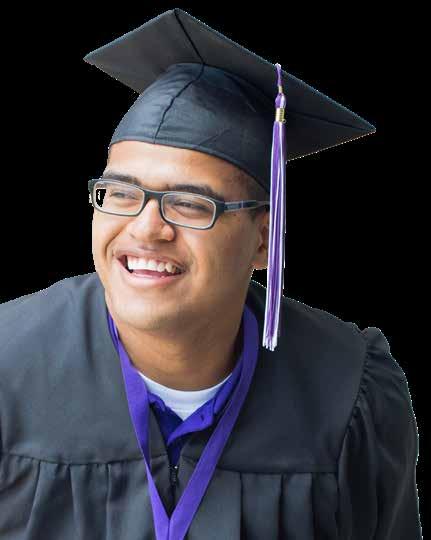

By GRAYSON FREESTONE Reporter
The Weber State University volleyball team defeated Idaho State University 3–1 on Oct. 3. The Wildcats were left stunned after falling short in an extended first set against the Bengals.
The Wildcats got within a point of clinching the first set twice, 24–23 and 26–25, but couldn’t close it out. The Bengals took the early advantage off of two kills and a Weber service error, winning 28–26.
Losing the first set was not a good sign for the Wildcats, considering their last three matches ended in sweeps (two losses and one win).
However, the Wildcats ended that trend by bouncing back with a cleaner win, 25–19, headlined by a four-point set-clinching rally to even the match 1–1.
Head Coach Jeremiah Larsen was compli-
mentary of how Idaho State played, while recognizing that one set doesn’t end a game.
“We just didn’t make a big deal out of it. Idaho State was playing really well. They played a great match,” Larsen said. “We could have freaked out and instead we just kept doing the things in which we know. It was so tough to pass well and take quality swings. At the end of the day, that’s all we can do.”
Right-side hitter Rose Moore saw the backand-forth loss as an issue with the home Wildcats playing poorly.
“We knew we weren’t playing great and that it was ugly,” Moore said. ”But we just kept telling each other in our little huddles between each point, ‘Keep grinding this, we’re competing well, we’re going hard, effectively, physically and emotionally. The outcomes are just not working right now, but if we keep going hard, then it’ll all come together.’”
From there, Weber never looked back, winning 25–23 and 25–19 for their 10th win of the season.
Coach Larsen was proud of his team for weathering the storm and coming out with a win over the now four win, 11 loss Bengals team, “It wasn’t a clean game. We had a lot of weird things, like ebbs and flows with certain players ... I like how we just grinded it. Normally, when players are up and then they crash, our whole team crashes. So I thought we did a nice job of grinding. It’s something we haven’t done a lot of, so I’m happy with that.”

Weber State will continue their threegame home stand with games against Eastern Washington University on Oct. 9 and the University of Idaho on Oct. 11.
Weber State University outside hitter Kaylie Ray (#12), jumps for the ball overhead to spike on the opposing team’s side.
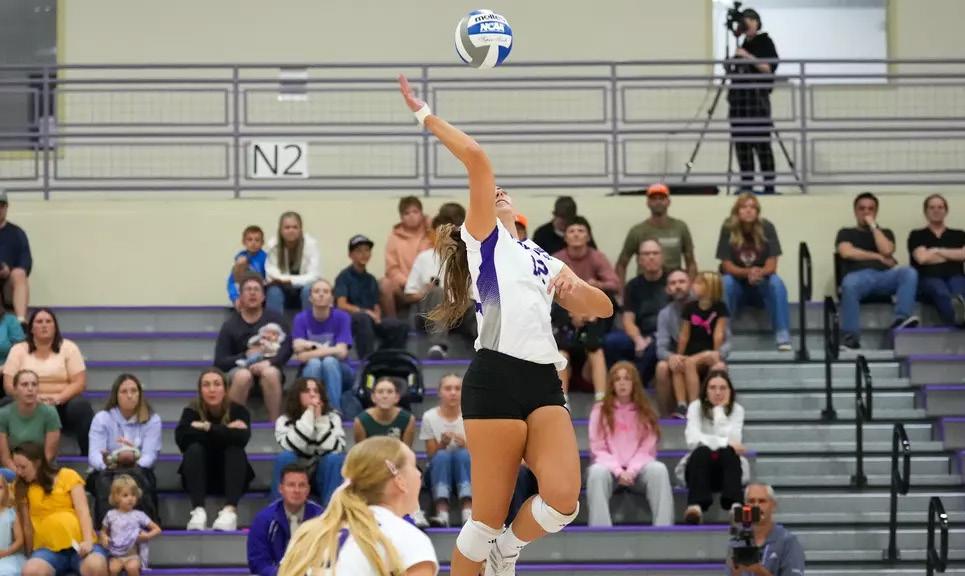

your book
Are you in a book club or want to start one?
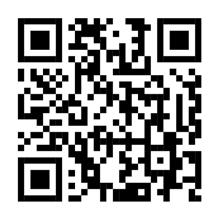


Por DAVID ROMAN AROS Co-Editor Por GRAYSON FREESTONE
El equipo de voleibol de la Universidad Estatal de Weber derrotó a la Universidad Estatal de Idaho por 3-1 el 3 de octubre. Las Wildcats quedaron atónitas tras caer derrotadas en un prolongado primer set contra las Bengals.
Las Wildcats estuvieron a un punto de llevarse el primer set en dos ocasiones, 2423 y 26-25, pero no pudieron cerrarlo. Las Bengals tomaron la ventaja inicial con dos remates y un error de saque de Weber, ganando 28-26.
Perder el primer set no fue una buena señal para las Wildcats, teniendo en cuenta que sus tres últimos partidos terminaron en
derrotas (dos derrotas y una victoria).
Sin embargo, las Wildcats pusieron fin a esa tendencia al remontar con una victoria más clara, por 25-19, destacando un rally de cuatro puntos que les permitió igualar el partido a 1-1.
El entrenador Jeremiah Larsen elogió el juego de Idaho State, al tiempo que reconoció que un set no decide un partido.
“Simplemente no le dimos mucha importancia. El equipo de Idaho State estaba jugando muy bien. Hicieron un gran partido”, dijo Larsen. “Podríamos habernos asustado, pero en lugar de eso seguimos haciendo lo que sabemos hacer. Era muy difícil pasarla bien y hacer buenos swings. Al fin y al cabo, eso es lo único que podemos hacer”.
La atacante derecha Rose Moore consideró que la derrota fue culpa del mal juego de las Wildcats en casa.
“Sabíamos que no estábamos jugando
bien y que era horrible”, dijo Moore. “Pero nos repetíamos unas a otras en nuestras pequeñas reuniones entre cada punto: “Sigan luchando, estamos compitiendo bien, lo estamos dando todo, física y emocionalmente. Los resultados no están saliendo bien ahora mismo, pero si seguimos esforzándonos, todo saldrá bien”.
A partir de ahí, Weber no miró atrás y ganó por 25-23 y 25-19, logrando su décima victoria de la temporada.
El entrenador Larsen estaba orgulloso de su equipo por haber capeado el temporal y haber salido victorioso frente al equipo Bengals, que ahora cuenta con cuatro victorias y once derrotas: “No fue un partido limpio. Tuvimos muchas cosas raras, como altibajos con ciertas jugadoras... Me gusta cómo lo hemos luchado. Normalmente, cuando las jugadoras están arriba y luego se vienen abajo, todo el equipo se viene abajo. Así que creo
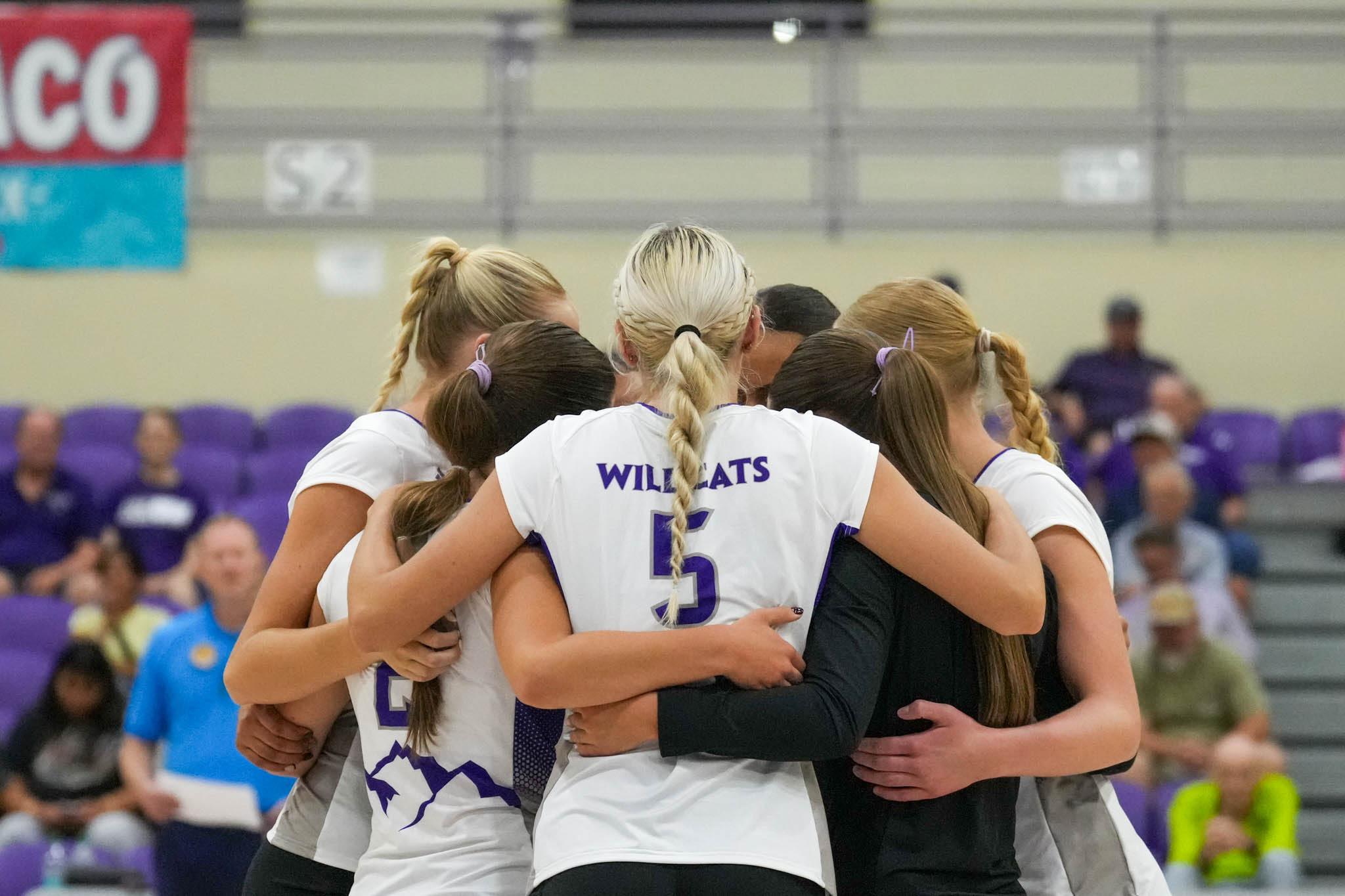
que hemos hecho un buen trabajo luchando. Es algo que no hemos hecho mucho, así que estoy contento con eso”.
Weber State continuará su serie de tres partidos en casa con encuentros contra la Eastern Washington University el 9 de octubre y la University of Idaho el 11 de octubre.



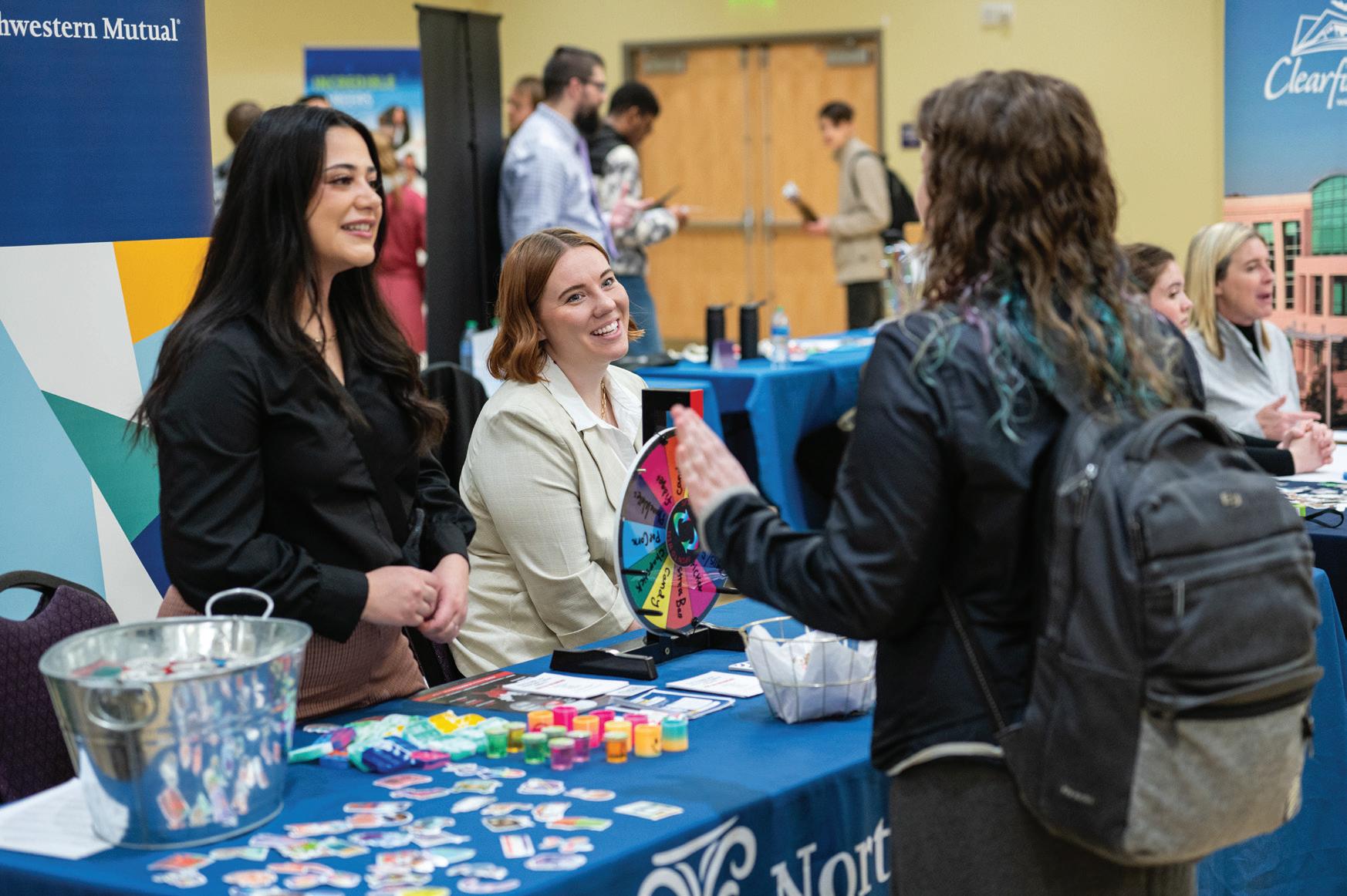
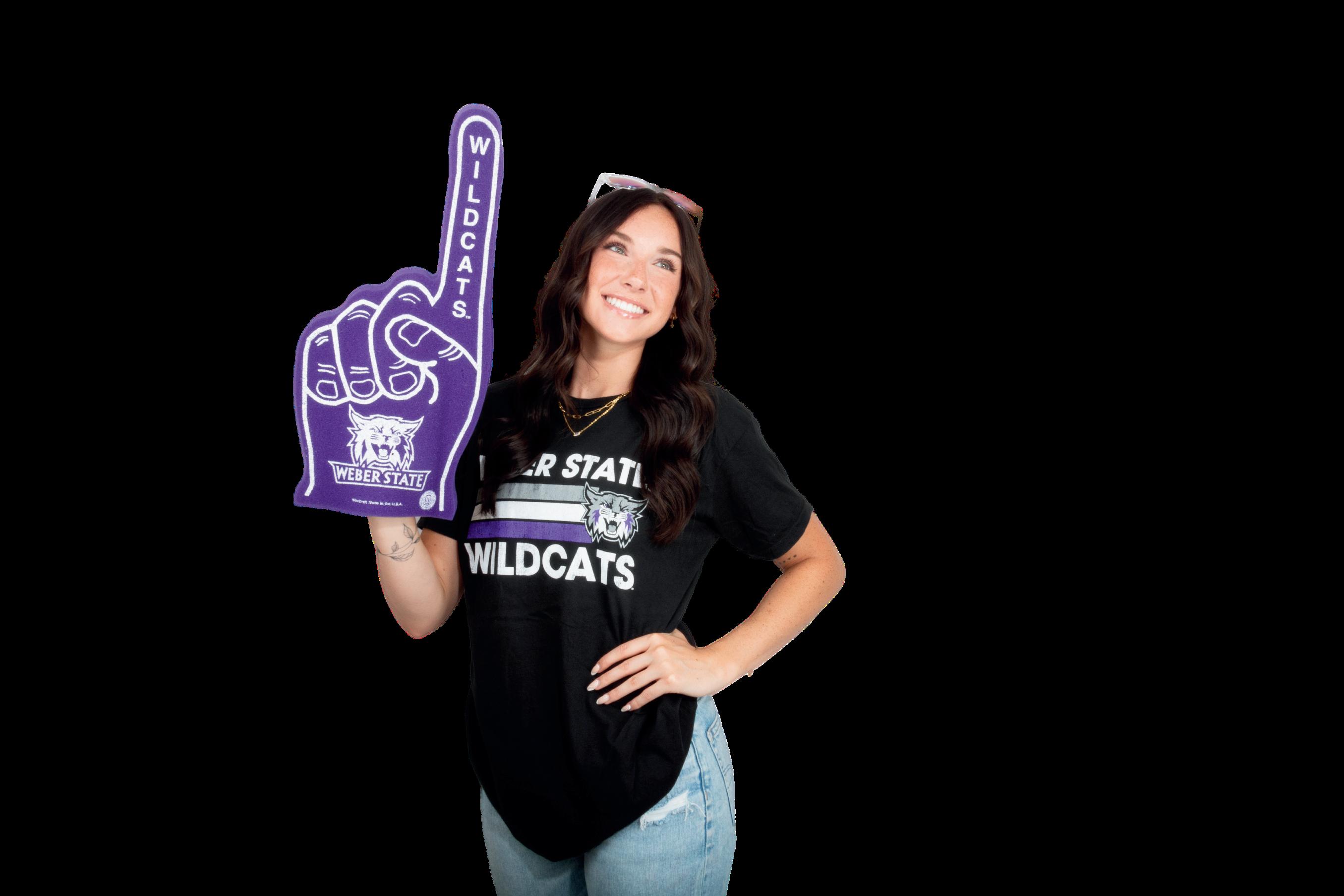



By WILL NAUGHTON Reporter
Weber State University’s women’s soccer team suffered their first conference defeat of the season, losing 1–0 to Portland State University in Ogden on Oct. 2 despite getting 15 more shots off.
Before the match, fans, friends and family came together at Wildcat Field to celebrate the academic and athletic careers of Weber State’s senior student athletes. Sammie Sofonia, Tenzi Knowles, Ella Sanders, Grace Kirby, Brynlee Meyerhoffer and Sayler Schlosser all received recognition for their time and achievements at the university.
Weber “came out flat” in the first half according to head coach Kyle Christensen. Despite a second half that saw the hosts register 14 shots to Portland’s two, the Vikings were able to hold on to the early lead they took through forward Aliayha Saldana. Portland State goalkeeper Natalie Cunningham made six saves to ensure the clean sheet, influencing the match with her long-range distribution.
Ten minutes in, PSU moved the ball from defense to attack with a string of passes on a counterattack up the middle of the pitch. Viking midfielder Bianca Potesta controlled the ball just outside the Weber State penalty area and played in Saldana, who took a touch
down the right side and found the back of the net.
Weber dominated the remainder of the match, but could only come as close as hitting the woodwork on two occasions. Christensen acknowledged the team’s shortcomings but lauded the Wildcat wingers and midfielders.
“I thought we left some opportunities out there. I think we could have done a little better with decision-making in and around the box as well, to create better opportunities. But, overall, it was us all second half and we were just unlucky,” Christensen said. “Our wingers created a lot of success; They were able to get to the end line quite a bit and create a lot. The midfield did a good job of controlling the game when needed as well.”
One such winger was Kirby, who had fans on their feet throughout the match with her dribbling. Unsatisfied, she sees the result as a new beginning.
“This is a good learning opportunity for us,” Kirby said. “We’ve gone 2–0 for the conference season, and to lose gives us a chip on our shoulder; an edge. This will be good for us.”
The Wildcats will next venture north to take on the University of Montana in Missoula on Oct. 9.
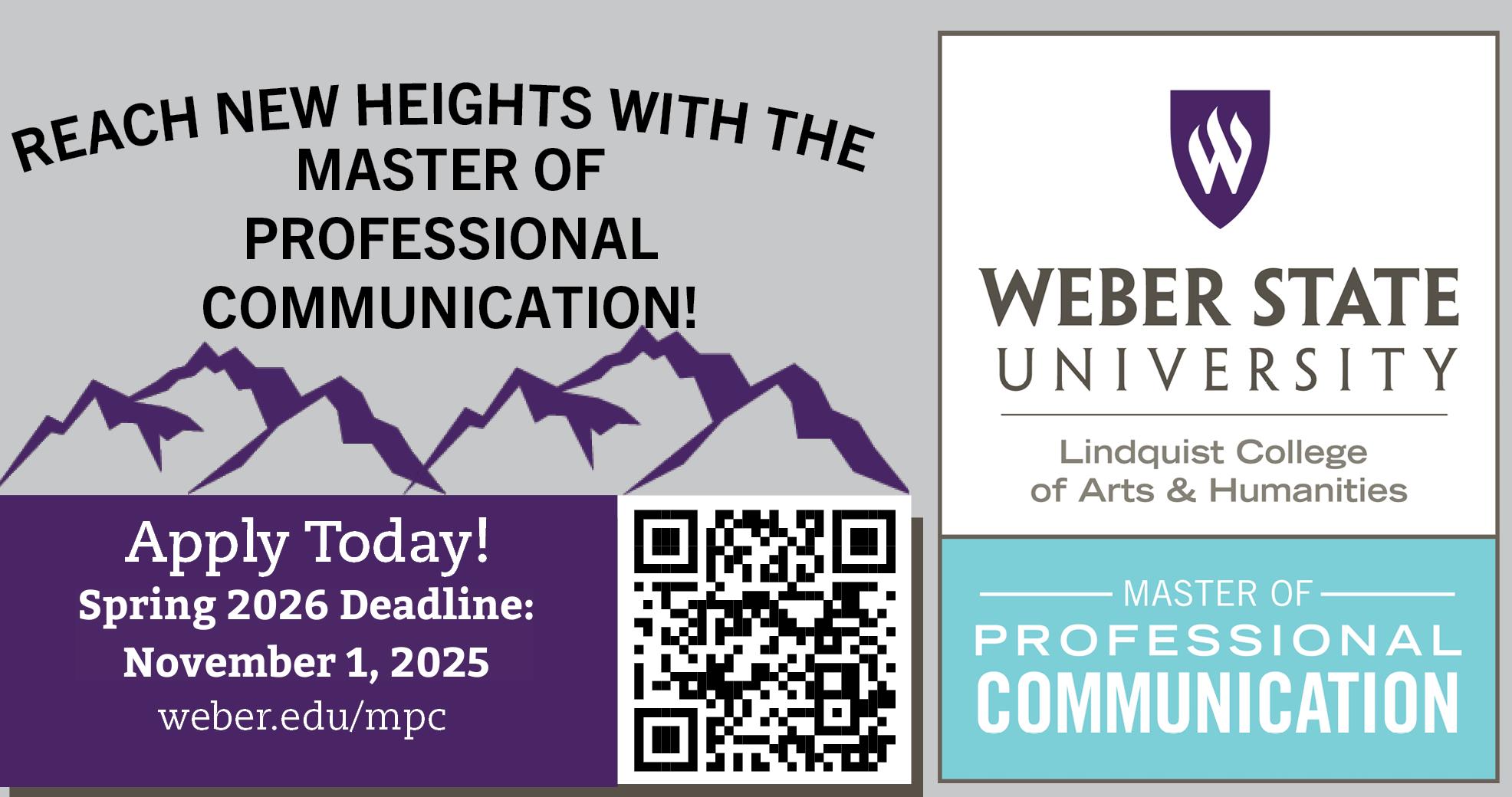
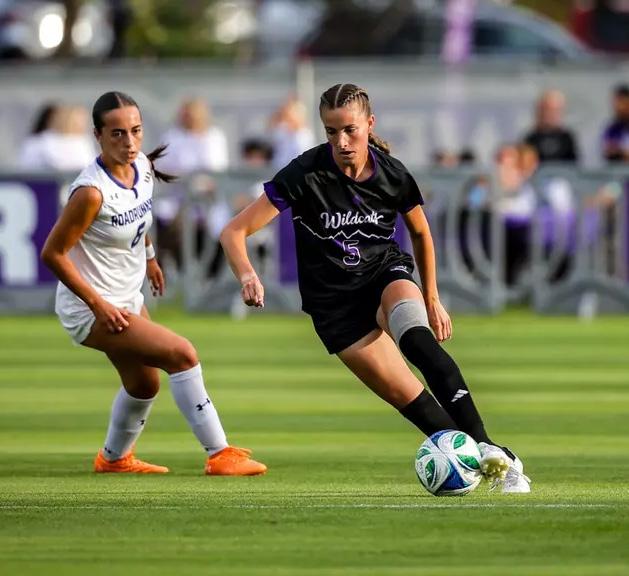
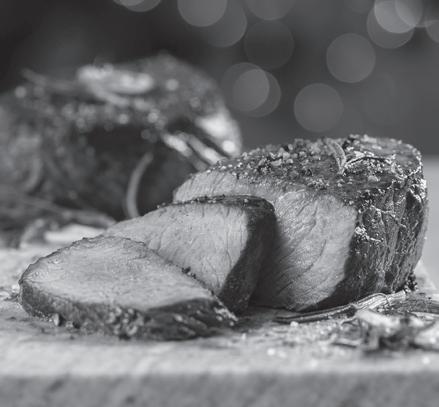


Por LUNA MALAGON SOLORZANO TRADUCTORA
Por WILL NAUGHTON Reportero
El equipo de fútbol femenino de Weber State University sufrió su primera derrota en la conferencia esta temporada, cayendo 1–0 ante Portland State University en Ogden el 2 de octubre, a pesar de haber realizado 15 tiros más que su rival.
Antes del partido, aficionados, amigos y familiares se reunieron en el Wildcat Field para celebrar las trayectorias académicas y deportivas de las atletas de último año. Sammie Sofonia, Tenzi Knowles, Ella Sanders, Grace Kirby, Brynlee Meyerhoffer y Sayler Schlosser fueron homenajeadas por su tiempo y logros en la universidad.
Según el entrenador Kyle Christensen, Weber “salió sin energía” en la primera mitad. Aunque en el segundo tiempo las locales registraron 14 tiros frente a sólo dos de Portland, las Vikingas lograron mantener la ventaja tempranera que consiguieron gracias a la delantera Aliayha Saldana. La arquera de Portland State, Natalie Cunningham, fue clave para asegurar el arco en cero, destacándose además por su distribución de largo
Editor-in-Chief
Nelly Hernandez Tejada nhernandeztejada@mail.weber.edu
Managing Editor
James Gordon jamesgordon@mail.weber.edu
Collaboration Editor
Bryce Odenthal bryceodenthal@mail.weber.edu
Design & Graphics Editor
Izabelle Cordeiro icorderio@mail.weber.edu
Photography Co-Editor Anna Kuglar briannakuglar@mail.weber.edu
Photography Co-Editor
A.J. Handley andrewhandley@mail.weber.edu
alcance.
A los diez minutos de juego, PSU pasó rápidamente de la defensa al ataque con una serie de toques en un contragolpe por el centro del campo. La mediocampista Bianca Potesta controló el balón justo afuera del área de Weber State y filtró un pase para Saldana, quien dio un toque hacia la derecha y definió al fondo de la red.
Weber dominó el resto del encuentro, aunque sus intentos más peligrosos se estrellaron en dos ocasiones contra los postes. Christensen reconoció las falencias del equipo, pero destacó el trabajo de los extremos y mediocampistas.
“Creo que dejamos escapar algunas oportunidades. Podríamos haber tomado mejores decisiones dentro y alrededor del área para generar opciones más claras. Pero, en general, todo el segundo tiempo fue nuestro y simplemente nos faltó suerte”, dijo Christensen. “Nuestras wingers hicieron un gran trabajo, lograron llegar a línea de fondo varias veces y generar mucho. El mediocampo también supo controlar el juego cuando fue necesario”.
Una de las jugadoras destacadas fue Kirby, quien hizo levantar a la afición de sus asientos con su habilidad para el regate. Aun así, no quedó conforme y ve el resultado como
News Editor Alfonso Rubio alfonsorubio@mail.weber.edu
Sports Editor Gavin Nelson gavinnelson1@mail.weber.edu
Asst. Sports Editor Brayson Brown braysonbrown@mail.weber.edu
Culture Editor Jared Mitchell jaredmitchell@mail.weber.edu
Chief Copy Editor Mindy Brown mindybrown1@mail.weber.edu
Translation & Asst. Chief Copy Editor Tomas Quintero Uribe tquinterouribe@mail.weber.edu
un punto de partida.
“Esto es una buena oportunidad de aprendizaje para nosotras”, Kirby dijo. “Habíamos empezado 2-0 en la temporada de conferencia, y perder nos da una motivación extra, un empuje. Esto nos va a servir”. Las Wildcats viajarán al norte para enfrentar a la Universi-
Defensora de Weber State University, Brynlee Meyerhoffer (#21), patea la pelota bajo el campo lejos de una jugadora rival.
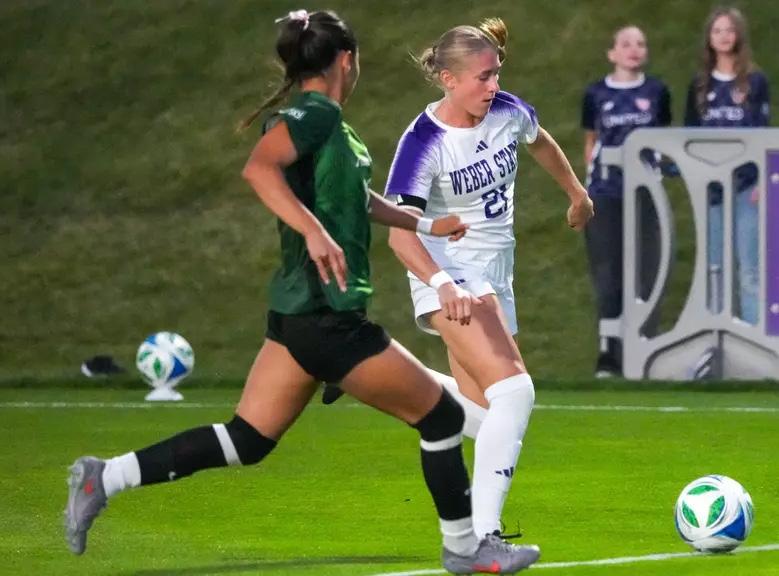
Translation Co-Editor Victoria Hernandez victoriahernandez1@mail.weber.edu
Translation Co-Editor David Roman Aros davidromanaros@mail.weber.edu
Business Manager Robert Steedley robertsteedley@weber.edu
Adviser
Jean Norman jeannorman@weber.edu
